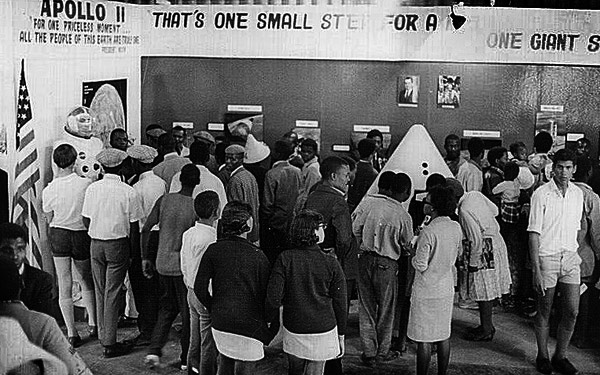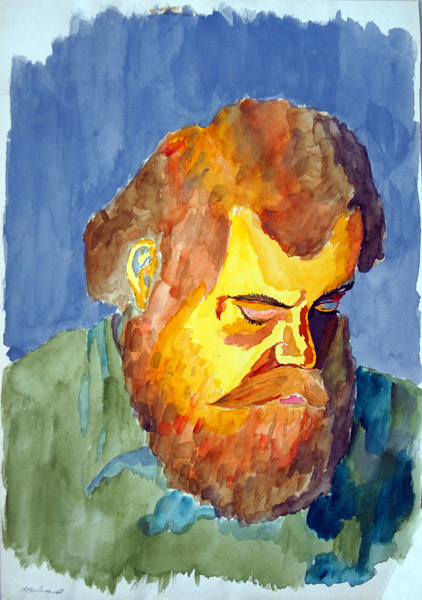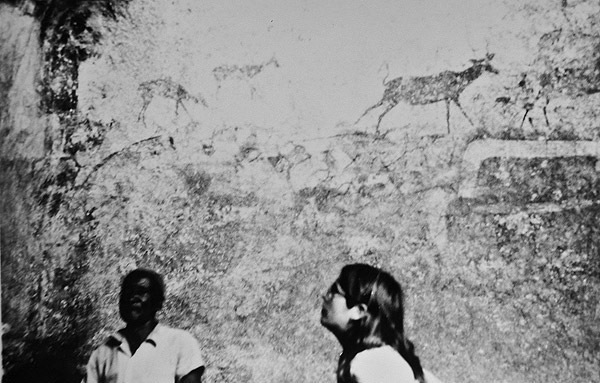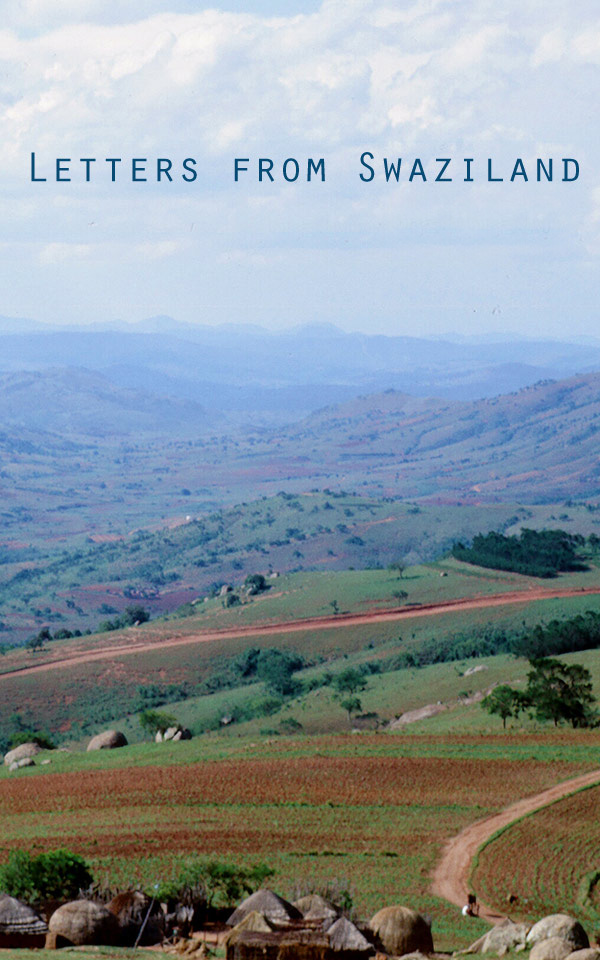
Cover Image: Entrance to the Mtombazani [Little Woman] Valley in North Central Swaziland
January 1969 - December 1970
Luyengo, Swaziland
January 2, 1969
Swaziland is beautiful beyond my greatest expectations. It is a very green country covered with mountains and deep valleys. The distances you can see are breathtaking. But I shall tell you more later.
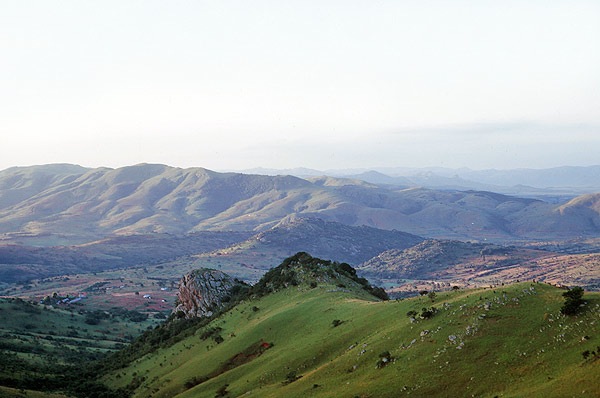
Swaziland was most characteristically grass covered mountains with traditional homesteads scattered across them. At the same time the country was rapidly ‘modernizing’ with growing urban and industrial centers, such as Manzini where I lived and taught. To see motorized vehicles parked at a homestead while rare was not a surprise.
Traditional "Beehive" houses are seen to the right in the homestead below. The interiors are cozy with the sweet smell of dried grass from their thatch and shiny smooth hard floors made, remarkably, from a mortar of earth and cattle dung. The cattle pen [aka kraal] behind the beehives is not only typical of a homestead, but also a central feature of Swazi social order. It is deep subject, far beyond the scope of this story, but for those interested I would highly recommend Hilda Kuper's landmark work The Swazi: A South African Kingdom.
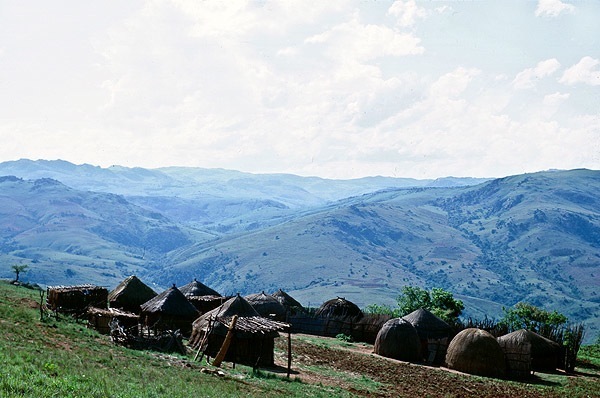
As for my trip, I did not get out of Detroit until 6:00 p.m. after having two flights to JFK cancelled. I finally ended up taking a flight to Newark. I spent the night near the Times Square area in Manhattan using my Shell card to take care of my expenses.
The following day, I visited the town stopping at both the Guggenheim and the Metropolitan Art Museums. Around 8:00 PM that same night we boarded our KLM Charter and started our six hour trip to Amsterdam.
The flight was comfortable and we were well fed. Dawn soon broke as we headed East and my first sight of Europe was from a 35,000 feet distance view of Glasgow Scotland.
Amsterdam was cold and snow-covered. KLM provided us a bus into town and back, so that we were able to spend about ten hours in the city. I did visit the Rijks Museum where I saw some of the great Rembrandt paintings.
We left Amsterdam at 10:00 p.m. and began our long flight. The flight’s first leg took between 8 and 10 hours, with a very brief stop at Zurich, Switzerland. From there there was the long seven to eight hour stretch to Brazzaville in the Congo. We stopped there for 45 to 60 minutes. When we unboarded, the heat and humidity were intensely high, for this is a tropical city near the equator. Brazzaville as you remember was an area of heavy fighting during the Congo crisis days. From there we flew to Johannesburg.
Next we boarded a small two engine airliner that flew us at cloud level the remaining two to three hundred miles to Swaziland where my 10 thousand mile trip ended. The plane was so small, however, that we will not get our baggage until tomorrow, Friday. We will not even have a change of clothes.
Our trunks are not here, but they are expected quite shortly
Currently we are staying in Luyengo, Swaziland at the Swaziland Agricultural College where the remainder of our team, the Rural Development and Community Development workers are and have been.
I have been able to borrow some clothes from my training camp roommate [Steve Hank] so I have not been too uncomfortable during the time when there is no baggage whatsoever. Currently we are going through an in-country orientation which is emphasized by boring speeches and trips.
The atmosphere here is so American and hence the boredom, as almost all of us are wishing to get out and mingle among the people on our own rather than in groups.
Yesterday we visited a game reserve and I got a number of good wild life shots, but I am afraid of the results as I had incorrectly sent my film speed and probably underexposed my game reserve shots.
It will be another 8 to 10 days before we move to our permanent houses.
I met my British volunteer with whom I will be working at Salesian. He is quite okay. So that situation seems more promising. He is also somewhat skeptical or rather defensive about Peace Corps as being better prepared for their task than the British, a point which I had to go to lengths to unentangle him.
His attitude which is reflected by other British volunteers comes no doubt from their perceiving us as eager idealists which is the same way we had incorrectly perceived them.
This letter costs 12 ½ cents or (16 US) and is the cheapest airmail I can send. A regular letter costs me ear 25 cents (or 35 cents US). When I refer to costs here you can add 40% to figure out US meaning. Thus one Rand = $1.40 or R20.00 purchase is therefore $28.00.
Manzini, Swaziland
January 26, 1969
The climate here remains quite hot but the humidity is pleasant. It must be about 95 degrees today so I’ve been swimming here at the Salesian [School] pool to fight the heat.
School has started and I am quite busy. I am teaching two levels of mechanical drawing and woodworking plus a course in new math (spelled maths here and pronounced “matts”).
Yesterday, at our teacher’s meeting it was decided to allow the teachers to wear safari suits. These suits are Bermuda length pants, knee high knit socks and a matching jacket-like shirt. I have a picture of myself in one on my present roll of film and will send once the film is developed. Anyway we can wear these during hot weather so I pumped R12 in to a suit yesterday (about $17).
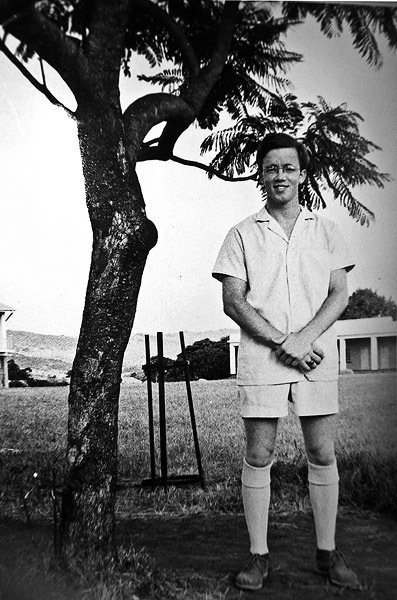
Yeah that's me. Safari Suits, as these loose-fitting shorts and jacket combinations were called, may appear awkward looking but they are extremely comfortable in hot weather At the time they were accepted as business attire equal to suit and tie. They were a heavy fabric that did not cling to the skin and allowed air to circulate.
My courses which require a separate preparation will have some relief. On top of that I will be conducting sport with some of the younger [Salesian] brothers and the two British Volunteers – Chris and Martin. Also we open the shops for 3 nights a week for recreational purposes.
We continue to live in our palatial 3-bedroom house, but it lacks screens so we have to suffer heat at night or be devoured by mosquitoes. We are still awaiting instructions to move to less extravagant housing.
It is rather difficult to think of snow on the ground or the fact that you are probably just getting out of bed now (there is 8 hours difference).
Life nevertheless continues to be quite pleasant. I’m eating quite well by virtue of the fact that I get two quite good free meals a day here at Salesian. So with the food and the pool, the intense work schedule is lessened. My radio works quite well but these batteries were always a little weak. I can get good programs out of South Africa and Mozambique in English, South African Dutch (Afrikaans) and Portuguese.
I plan to travel to Mozambique for Easter holidays to Lorenzo Marques.
Manzini, Swaziland
8 March 1968
Well I am 24 already. That’s getting hard for me to believe. So like an old man that I’m getting to be I spent my birthday in hospital and am getting released today after a four day visit. I was put in here on suspicion of appendix trouble by the Peace Corps doctor, but resultant tests disproved that finding that I had contracted instead a digestive tract parasite for which the cure is a simple gulp of some wretched tasting medicine that by its taste alone will be enough to kill the parasite.
In any case it’s gone by the way. I lost 3 days of school, but got a lot of reading done and a number of letters written.
So in true P. Corps fashion I’ve picked up a parasite. I’ll have to work on malaria next.
Otherwise my school activities have been quite involving as I have a heavy schedule and five different preparations. I’m learning the short-cuts and catching up now however.
The days are hot in Manzini alt. 1920 ft. and the hospital stay in Mbabane at 4200 ft. was refreshing because of the coolness: Manzini however will be pleasant when the “winter” comes in June whereas Mbabane will be too chilly.
I’m still living in that $20,000 3 bedroom furnished place in the upscale area of town and as there is little indication now that we’ll be moving we’ve fixed up the interior somewhat and converted the largest room into a “crash-pad” with three beds for the volunteers who drift into “civilization” for the weekends.
´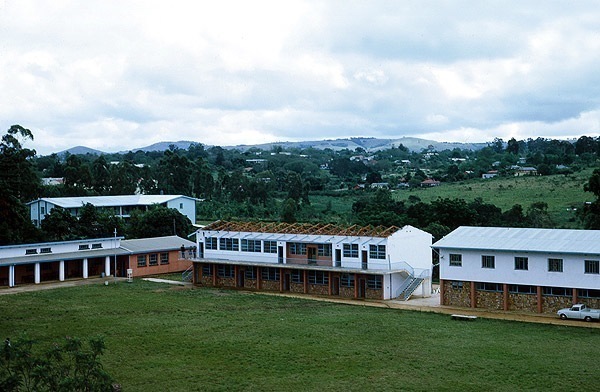
Salesian School was an all-boys Catholic school operated by the Salesian Order and managed by mostly Irish priests and brothers. It was located on the SW edge of Manzini, a city of about 25000 considered the commercial hub of Swaziland. The core of Salesian School was a square of buildings surrounding a grassy parade ground that was surrounded by wide fine gravel walkway. In the picture above one of the buildings had had its metal roof blown off in a recent thunderstorm. It had occurred at night and the roof landed behind the building. No one was hurt. The land is lush green indicating that it is a couple of months into rainy season. Across the green meadow on the right lay the house where I first lived. I crossed the meadow to school each day.
The nonclerical teacher’s staff room was on the left end second floor of the damaged building. I remember it most for the card game called ‘Viet Cong Casino’. I played this lively partner game with other teachers during tea breaks and lunch times from start to finish of my tenure, which also drew me close them personally. The staff was predominately South African-educated teachers of African descent. At least two were refugees from the Apartheid regime and, as I learned later, important figures in the movement who were quietly recruiting Salesian students into the rising anti-Apartheid resistance movement. Despite its peaceful setting history would later reveal that Salesian was a hotbed of the movement and Manzini a center of operations.
Some of them in the bush-veld areas are bad-off (below 500 ft. alt) where the temperatures are high, with no electricity and no safe water except from the rains that rarely come there or the trucked-in water.
Financially I am managing fairly well. My expenses are greatly cut due to the fact that I eat my meals for free at the school. So only the utility bills of about R4 a month bite into to R58=$81.00 allowance. However, I squander a lot of money needlessly and eat out fairly often so I’m not that thrifty.
P.S. How would you like having a student with the following first names: Absalom, Shadrack, Lot, Isaiah, Napoleon, Nimrod, Idesbald and Humphrey!?
8 March 1969
Mbabane, Swaziland
I’ve just completed a roll of 36 exposure of black and white mainly of Manzini but also of the Incwala ceremonies. The color slides and the last 10 exposures underexposed because I had monkeyed with my film speed setting the previous day and then forgot to reset it for color which is a slow speed.
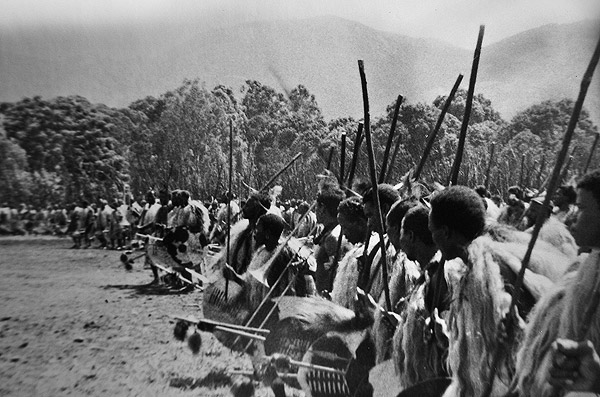
Very soon after arriving I attended Incwala, the biggest event on the Swazi calendar. Traditional and modern Swazi from the entire country don warrior attire and gather at the Royal Kraal of King Sobhuza where a sequence of events occur. Dressed in traditional Swazi warrior attire, the warriors form battle lines, dance and chant before the Royal Family.
This picture below taken by a Swazi free-lance photographer who was kind enough to send it to me, typical of the generosity I would receive from Swazis during my entire stay. I had a shirt fashioned from a Swazi print. In its center can be seen the shield and spear symbol that is on the Swazi flag and represents those carried by the Swazi’s in warrior attire to my sides.
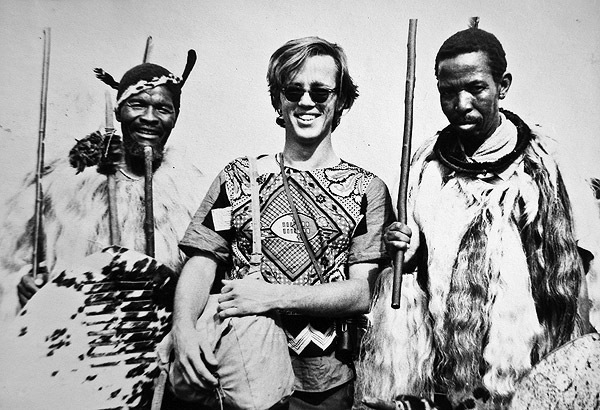
Film exposures are comparable or slightly cheaper than at home. I can get a roll of pre-paid processing Kodak Kodachrome II for R2.40=$3.36 (that includes processing). If you hold those darker slides of mine up against a bright light there not to bad, but they don’t project very well. I’m still looking for a telephoto attachment for my camera as I can get better game (and people) shots.
I want to get an international drivers license which only requires valid license first. I haven’t driven since I’ve been here because the right side steering is terrifying.
I am taking out a visa for Mozambique for over Easter as will now have 11 days vacation. I plan to spend the time relaxing on the Indian Ocean in Lorenzo Marques.
Citrus season has begun. Pineapples are at their height – only 5 cents for pineapples the size of 10-12 inches high. Gunnar, the Dane who manages a pineapple factory, and with whom I play chess, gives me one gallon cans of canned pineapple whenever I wish.
Manzini, Swaziland
March 28 1969
I am sitting in a Form IV study period from 3.00-4.30 for a couple of weeks so I have the time to do my grading and other school work before I return home.
School ends tomorrow at noon for 12 days (beyond the Monday after Easter). I am planning to go to Lorenzo Marques in Mozambique for the vacation (here called holidays) providing my visa comes through all right. I applied in good time and it should be in Mbabane when I hitch up there tomorrow.
Lorenzo Marques is about 80 miles from here and is on the Indian Ocean. Actually we are not supposed to take out-of-the-country leave until April 4 but I’m going to do it on the sly and on my own money. Peace Corps office can be a nuisance in these matters.
Otherwise things are getting into a solid routine now and my teaching is getting a bit more proficient. The weather has cooled as we are now heading toward winter and this makes our classes and nights much more bearable.
The English influence is pronounced here by the morning and afternoon teas so I drink tea everyday at 10.00 and 4.00. There is plenty of coffee, however I haven’t had a good cup of coffee since I’ve been here.
The restaurants have two features that I really miss and that is a glass of water before the meal and a second cup of coffee. They have no conception of the hamburger although they do sell something under that name.
My health is looking up and I feel as good as ever. My exercise comes in my 15-20 minute walks between here and home. I plan to buy a bicycle as soon as I’ve saved a bit more money. This will be especially true once we move to our new place. We are supposed to move “within the month” but Swazi months can be long. I’m not sure what our new place will be like but I’m quite sure that it will be a modern two floor flat – furnished of course.
Phil, my roommate, has come by a Datsun pickup truck which he needs for his small business consulting as he travels though-out the Manzini District of the country. So now we have a limited amount of transportation.
Our new place will be much nearer the downtown area and will be more convenient for shopping etc. although I will be slightly further away from the school.
Our house is somewhat of a hostel on weekends for others from the bush so we frequently have 6-8 people passing through every weekend. This is due to the centrality of Manzini as well as its shopping area and entertainment.
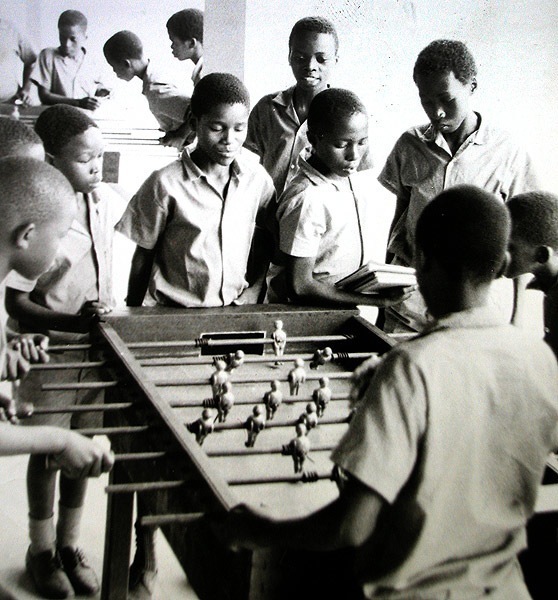
Table football was immensely popular and played with vigor and passion. One of my first tasks at Salesian was to repair the school’s broken down tables and repaint the field and lines, an act that earned me some early student appreciation.
Student ages varied from 13 to sometimes 20 and were mostly from Swaziland. There were many from South Africa who se parents were living in Swaziland as professionals and businesspersons.
One student would became a life-long friend, Themba Mbewu [aka Russell] Sukumane. He was never a student of mine as he was in his last year at Salesian during my first year and my students were all first and second year. He would become my guide to the subtleties of Swazi culture, politics and manners. We would meet up again when he came to the US for post graduate studies. Coincidentally, on the day of Themba's visit, King Sobhuza II, whose nominal reign lasted 82 years, would pass away.
Themba obtained a job with the US Consulate as chauffeur among other tasks.
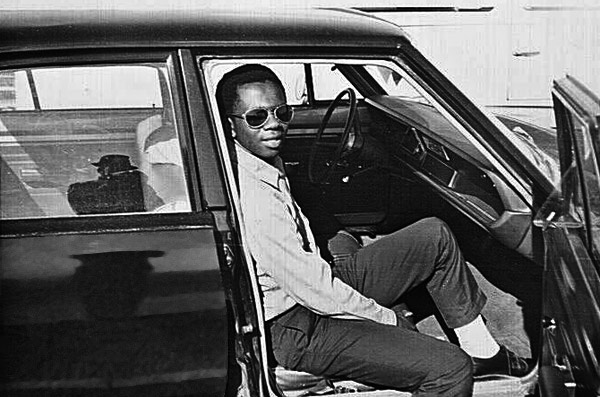
I know my students much better now. They are really good kids but the Form I students tend to be a little playful at times.
Our school tends to be somewhat of a showpiece school so we always have visitors flocking into the school. This rather bothers me at times.
Our school excels in track and we won the district championship quite handily. I had to officiate some of the field events. The track meet was heavily attended and quite competitive. Several of the runners ran barefoot of course, but most of the younger students here go barefoot with only shorts and their blue school shirt.
The Salesian student is typically quite poor and quite bright. The Salesians try to keep it that way too.
Lorenzo Marques, Mozambique
2 May 1969
‘School’s out teacher’s let the fools out’ and is enjoying himself greatly in a very foreign, very far away city on the Indian Ocean called Lorenzo Marques.
This is my second of at least twelve days here in this colonial Portuguese port city. I was quite amazed to find the city so large modern and American-like with giant department stores and the like. Somehow I had expected a Mexican-type city. Instead there is this very clean and friendly city.
I hitched to the Swaziland border and then took a very slow train to L.M. I’ve been traveling with a South African volunteer. In any case I got here and am staying in a quite nice hotel room for $5.00 a night and that of course includes breakfast.
I’m going to look for a real cheap place say $2.00 (which you can get here and is still as nice) for the remainder of my visit. So I have now dipped my toes in that ocean on the other side of the earth for what it is worth.
In the daytime I explore the city and read a book on the Portuguese language, which is remarkably like Spanish, and therefore I can already get along in the language.
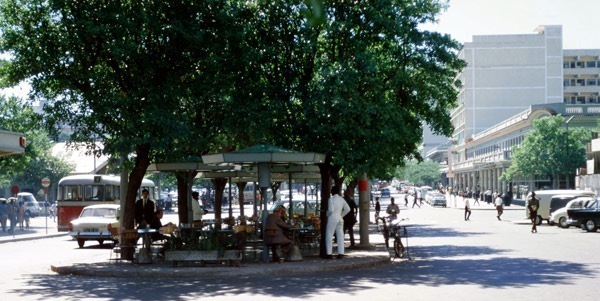
Lorenzo Marques, renamed Maputo after liberation from Portuguese colonial rule, had a prosperous core with broad avenues and slow-paced sidewalk cafes, such as the one in the island of this boulevard.
There are numerous sidewalk cafes and miles of abandoned quiet beaches that look out at an equally quiet and abandoned ocean. The whole scene is very peaceful and I feel forgotten and forget Manzini, Swaziland and the US I shall probably spend many days in this city before I leave this part of the world.
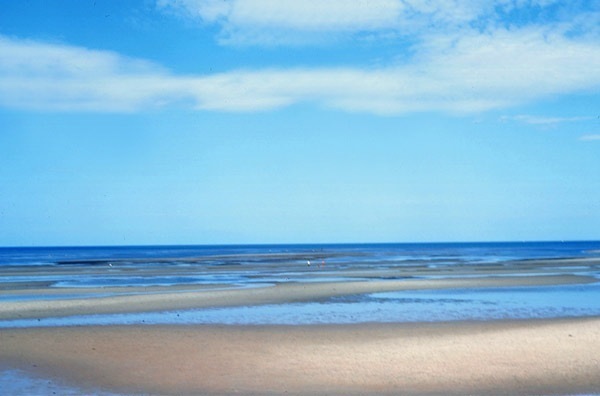
The beaches of the Indian Ocean spread for miles from the north end of Lorenzo Marques. The waves were gentle and its tides created long tidal flats pushing the water’s edge back as much as a half mile. The white specks in the center of the picture above and to the left are people probing for shell fish in the low tide.
There is an excellent outdoor market here of which I shot quite a bit of color film the other day. With all the tropical fruit Indian, Chinese, African and other traders with brilliant clothes, there are endless photographic possibilities.
I’ve also traveled quite a bit in the back country areas of Swaziland and have a number of color slides of nature, people and general scenery of Swaziland. I’ll shoot up a roll of color in Lorenzo Marques quite easily and then will do some black and white.
School ended uneventfully. Things were running much more smoothly than in the beginning and I was reasonably pleased with my results.
We are out now until 27 May then back to school until late August – another month off then school until December for another month break. Three terms is how it works.
While students pass or fail each year the essential thing is that they pass a standard British-type exam after their third and then fifth year of high school. I think it is a very retarding system. The very good student really has no need to do homework for they mean very little. It’s the exam in the end that is the important factor.
Our house is still ours and no more word about moving. At least we have our 1 ½ cu. ft.. refrigerator (now that summer has past). It is gas powered – more expensive. I also purchased a bicycle two or three weeks back as I got tired of walking. That cost $36.00. Financially I stay ahead alright, but do not seem to be getting ahead as I thought I would.
Anyway the days are pleasant now and the nights are cool enough for a blanket. Citrus fruit is in. Pineapples are disappearing.
Manzini, Swaziland
15 May 1969
I have return from Lorenzo Marques after a ten day visit. As it was I finally found a youth hostel-type place that only cost about 85 cents a night run by a nice old Portuguese lady with the English name of Mrs. Green. That enabled me to prolong my leave time.
School begins again on the 27th. Winter is coming here so the nights are chilly now – only in the 50’s though, but it does seem colder after the lengthy spell of heat and pleasant weather. I actually caught a bad cold in Lorenzo Marques when I didn’t cover myself well enough and I am just now recovering from it.
Well it has been 4 and ½ months already since I watched you drive down the ramp and out of site at the airport. Time has passed rapidly and already I’m beginning to wonder if I will be able to do all the things I hope to do.
Progress with the language is slow but I have at last set up a plan of study with one of the students at Salesian starting next term. This should accelerate things considerably.
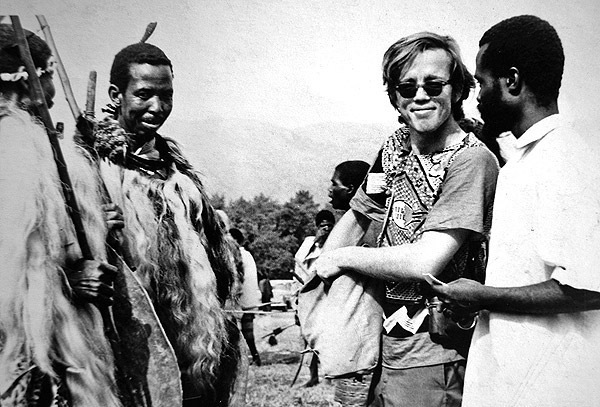
To my right below is Ambrose “Cooper” Khumalo who was a student at Salesian and also tutored me in siSwati. Swazi student often had three names, their siSwati name, an English [often Biblical] name assigned to them by the missionary schools and a ‘street’ name. Ambrose’s street name Cooper derived from the English boxer Henry Cooper.
Manzini, Swaziland
2 June 1969
The US Embassy here has $50,000.00 a year for self-help projects. These are projects where the community supplies a certain amount of money for some US AID project of community benefit. (AID=Aid for International Development or Foreign Aid as you know it).
I got to thinking, took out my camera snapped some pictures, made a brochure and turned my woodwork shop into a self-help project and succeeded in getting a grant of $2101.98 to purchase power woodworking tools for the shop. These include a 10” circular table saw, a 15” drill press, a wood lathe, a 6” jointer, a 16” jigsaw, a small air compressor and countless accessories of which I chose all the best equipment since the grant was either an all or no-go affair.
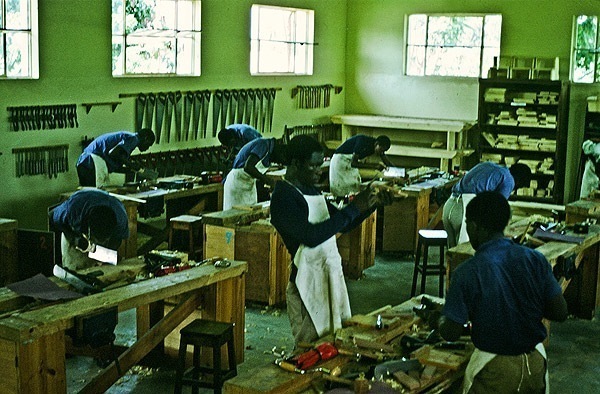
When I arrived at Salesian, the woodwork shop was newly built and heralded as the country’s first woodworking program for Swazi students. The shop was stocked with a full set of hand tools neatly hung on the walls, one for each student. I had been drawn into the position after a qualified volunteer declined to show up for training. With only two years of high school woodworking in my background I found myself in the situation of, “In the kingdom of the blind, the one-eyed man is king.” No one would know my inadequacies and in the end all worked out well. Seen here are the blue shirt, khaki shorts uniforms of the Salesian students. In the center background are benches that were being built for the Salesian’s rural elementary schools that we produced in off hours.
Preliminary approval which is the important step has been given, but I’m still in the midst of much paper work regarding signatures, invoices etc. I must hurry too to get the invoices in soon due to the fact that the US Financial year ends the 30th of this month.
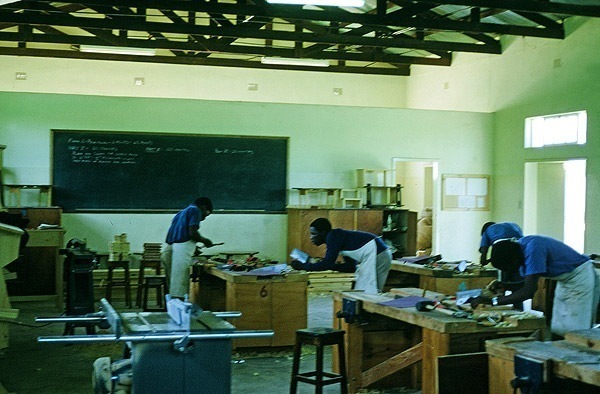
The table saw and jointer shown here were part of the power tool set I obtained from the US AID grant. When I arrived to find a shop of only hand tools, my first thought was, “Hand tool skillsets are essential but understanding of powered tools was in the long term is even more important”. The metal working shop, built across the courtyard had power tools and the technical studies students naturally preferred that course. The arrival of the power tools leveled that appeal. In the background right to left is the entrance to the shop, the door to the storage room, storage shelves with student projects on top of the, the chalkboard and my desk.
Steve Hank, a rural development volunteer who evolved into film making while in Swaziland and created a training film for successive Peace Corps volunteers, recently posted the following on YouTube that includes a clip from the Salesian School woodworking shop where I appear. Also see in are PC volunteers Sue Gray and Ron Pierce. My wordwork shop and I appear around 7:16 in the piece.
Our usual flock of weekend visitors come and go and the days shorten as we move toward “winter”. Citrus is in season here at present and it is good citrus, cheap and sweet oranges, navels, as big as grapefruit.
The South Africans condescended to play the Voice of America broadcasts on the crucial part of Apollo 10. I’m really regretting that there is no television in this part of the world because I would really like to see the moon landing.
Here it is – possibly the greatest event in the history of humankind. Rome, Columbus, and Napoleon will all be small in comparison to this moment when earth reaches out to the moon. And I’ll miss it on TV because the South Africans are afraid to permit TV in their police state. The nearest TV is Rhodesia and Zambia.
16 June 1969
Manzini, Swaziland
Already more than ¼ of my African stay is behind me. The time has passed rapidly and I find myself thinking about my post-Peace Corps adventures etc.
School is again in session and a variety of minor things have happened. We have moved from our house to another place that is smaller and in a lower class area. Nevertheless it is a new and comfortable two-bedroom duplex. About a month ago, I’ve forgotten to mention, my bicycle was stolen and has not yet surfaced. I am doubtful of ever recovering it.
Teaching continues to become easier as more school days pass. However the great number of different courses (5) still requires more time than I have available.
Manzini, Swaziland
12 July 1969
Term break is but five weeks off already and the worst of winter is behind now. The days a 70-80 and dry. It has been a long time since I have seen any rain – since May I think - and the landscape is becoming brown and dusty.
My classes are progressing, but I find myself hustling to get the boys caught up to the syllabus. The technical education was generally confused last year such that the year was generally lost and Chris and I consequently find our students a year behind. They take their J.C. exam at the end of the third year then advance (if their results warrant) to O-level exams at the end of five years.
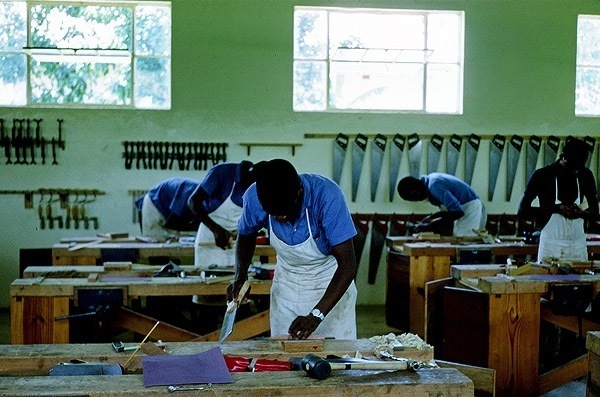
My 3rd year students are taking the JC exam in this picture, making a variety of joints from a blueprint. While we had machine tools, the British-influenced syllabus required all testing in hand tools only, a restriction of which I thought unrealistic terms of real world preparation, but was obliged to follow. I wrote the first JC exam which, as I learned years later, became the model for the country.
My first bad accident (actually minor) occurred yesterday when one of my first year boys ran a ¼ “ chisel through his forefinger. It entered the front and came out on the side of the tip. It took a couple of minutes to stop the profuse bleeding. It unnerved me somewhat as he was not to be using that tool and it was not the tool to be used for the purpose he used it for. Nevertheless it happened and I felt quite sorry for him. Later he told me it was nothing much – he had be stabbed six times in the arm, back and leg by tsotsi’s (young gangsters) in a Johannesburg location. [Locations are reserved areas for non-whites in South Africa. The South Africans set them up about 10 miles from major cities – far enough to keep them separate but close enough to steal their labor for ridiculous wages.]
I cannot remember if I have told you, but I was quite suddenly moved again when the District Commissioner informed me that I must find new accommodations immediately as he was moving someone else in with Phil. It was a rather impolite and sudden action on his part, but anyway I am now living in an 8x12 room at Salesian School. I was depressed initially by the room, but have adapted to where I do not mind it too much now. At least I can now sleep until a few minutes before classes.
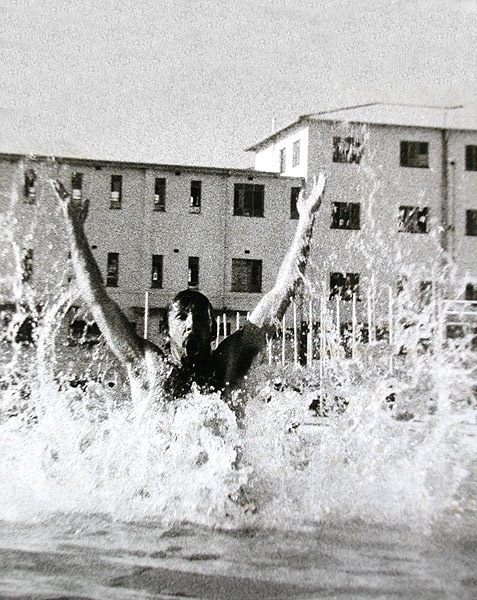
Compared to the stereotypical Peace Corps experience of the volunteer laboring alone in the bush, my experience was very comfortable. I had hot showers, flush toilets and electricity. Additionally Salesian School had a lovely swimming pool that was refreshing after hot summer classroom days. The always generous Salesians made it available to visiting volunteers. In this picture, my housemate Phil Peters pops up from underwater. In the background can be seen the dormitories of for the live-in students. The Salesian priests and brothers quarters were in the attached 3-story structure on the right.
Well I’m eager for the moon landing to occur but regret not being able to see it on TV. It will occur, if all goes as planned, at 7:30 AM on 21 July there which will be shortly before midnight our time. It will be a great event, but it is unfortunate that the American vanity will ruin it by planting an American flag and putting such a detestable plaque with an eagle on it and the President’s signature. It only goes to show that men who are rapidly reaching technical maturity are still emotionally children.
Soccer is the big sport here. I referee soccer at least once a week. Last week my woodwork boys played Chris’s metalwork boys resulting in my boys winning 2-1 in a budding rivalry.
Living here at Salesian despite the depressing room is financially positive for I have no expenses other than toiletries. Consequently I will have increased my local bank account from a low of $10 after the Lorenzo Marques trip to nearly $200 by the end of the current month.
All health problems have abated. I’m playing badminton about one night a week at the Portuguese Club here in Manzini and some tennis here at the school.
21 July 1969
Manzini, Swaziland
Three weeks of classes remain until exam week. The moon is half-conquered and I am now waiting for the radio to switch to the Voice of America for the take-off of the lunar module.
Needless to say last night’s touch-down and events were most thrilling even though I am unable to watch the events on television. (The embassy movie should be out in a couple of weeks.) I have fallen back on my mind’s picture which is fine for the time being.
Radio coverage has been comprehensive and the tenseness of the entire situation pervades. Presently it is seven minutes from lift off.
(Later) Well they are back in orbit about the moon. The technical achievements of that landing module are amazing considering that it had never been landed or blasted off from any surface and that it was landed in unknown conditions and terrain! Now for the rendezvous and the return home.
The students are quite keen about Apollo moon mission. I was greeted with expectant smiles and occasional congratulations this morning. I have already informed them of the propaganda barrage they could expect and commented that the American attempt foolishly risked three lives – which they did for the sake of being up on the Russians. It is truly a pity that the Americans and Russians cannot cooperate.
True to my expectations a moon landing display arrived in Swaziland as the US did its utmost to politically leverage the triumph. This picture shows the display at the Show Grounds in Manzini during independence celebrations. To the right of the astronaut manikin is my friend Themba Sukumane who was employed by the Consulate and who provided this picture. A picture of Richard Nixon and King Sobhuza II can be seen on the wall.
Otherwise, my ankle is good and my health OK generally. I guess the rabies scare has gone and I didn’t have to undergo shots. [This must refer to notes from a missing letter where I mentioned having severely sprained an ankle and been bitten by a dog.] My bike apparently is gone for good. I’m still living at Salesian.
I have adapted quite a bit better and appreciate some added comforts such as having my room cleaned weekly, my laundry done for me, and the short walk in the morning. It will get oppressive after a while I’m sure.
I’ve been developing a chess team with a couple of teacher’s here at Salesian playing some other men here in town on a team basis. In our first match we won 3-1 playing two boards. We hope to play next Sunday afternoon on three boards – each board (or player) playing two to three games so it will be 6 or 9 points that we will play for. I am also playing postal chess again in a Southern African postal tournament.
I have applied for 21 days of visa for Lorenzo Marques for the coming holiday. I’m not sure if I’ll stay that long, but I hope to be about two weeks. I may miss Mhlanga – or Reed Dance – a traditional event here, but I can see it next year of course.
Another Peace Corps volunteer has left – a girl who was out in the “bush”. Counting the engineer and his wife who will leave at Christmas that makes a total of six returnees with a good probability of others. Some are bored, others cynical, others simply disenchanted. [10 out of our 50 would leave early.] I’m quite happy thus far though and see no change of plans.
The check for my machines have arrived at the embassy from the Paris Regional France office, but the machines are not here yet.
I had an accident a while ago when one of my form I students ran a chisel through his forefinger. So naturally I’m apprehensive about machines. But they are an important and necessary risk. The boys are finishing their first projects and they have done quite well. The Form II students have built stools while the Form I boys have worked on simple beginner projects and are now completing some bookends.
Our shops and school are showpieces and we average at least one visitor per week from many countries. A while back, I think I told you, they made part of an educational film in my shop shooting up about one hour of film.
The visitors got to be a pain at times because they ask the same hackneyed and stupid questions – for example, “Can the African boys handle these tools without too much difficulty?” Their usual lines reflect a naive racism.
Anyway my visitors have included people from England, Nigeria, France, Denmark, Germany, Lesotho, South Africa, the United States, Italy and few other places.
Mechanical Drawing continues to be an extremely difficult subject to teach mainly because I have more of the slower students than Chris has. It gets very discouraging at times.
Maths is going quite well, but I should not teach it next year as my load of the technical subjects will increase as we will have three forms of technical studies by then and I will have to spend a lot of time with my form three’s because that is the year when they write their J.C. examinations.
L Marques, Mozambique
26 August 1969
Holidays are here again and I have returned to Lorenzo Marques to pass time until school comes again in mid-September. The weather is a pleasant dry winter weather that is neither too hot not too cold. The beaches are pleasant until noon when a strong breeze starts up.
I don’t have anything definite to do these holidays here, but I do have a lot to do back in Swaziland where my machine tools have at long last began to come in so I’ll be setting up there as well as doing my planning for the next term. I expect I must return in another week. I plan to return here in late November for a chess tournament.
During the long holidays from early Dec. to late January I plan to travel up through Rhodesia to Victoria Falls and as time and political situations permit, to Zambia and the Katanga providence of the Congo. I’ve applied for 30 days leave time which will give me $270 leave allowance. However, I plan to spend not more than $150 if possible. I may take a train up to Salisbury yet during these holidays.
Africa at present is in its most typical climate state. Contrary to ideas of Africa being hot steaming rainforest jungles (actually only 15% of the continent is like that) it is more often dry and very very dusty. Even the rainforest areas are dry now, but the spring rains will be staring shortly. By the way, one other recent issue of National Geographic magazine, so I’m told, has a pictorial article on Swaziland, but I haven’t been able to see one yet. You might look it up.
The Portuguese people are quiet and proper middle-class people generally. They are colonialist but do not have the same degree of racism as the South Africans yet, as at home, the white is on top and the black on the bottom. They live at a comfortable pace and take a lot of pride in having neat homes surrounded by complex gardens – all quite beautiful. They quite faithful Catholics and generally traditional, conservative and modest. Girls do not go out at night on their own – instead they are accompanied by their mothers. One has the feeling that everything here has an exact and calculated place so that everything is predictable. This gives the town a sleepy appearance – a nice place to retire or live easily and unconcernedly.
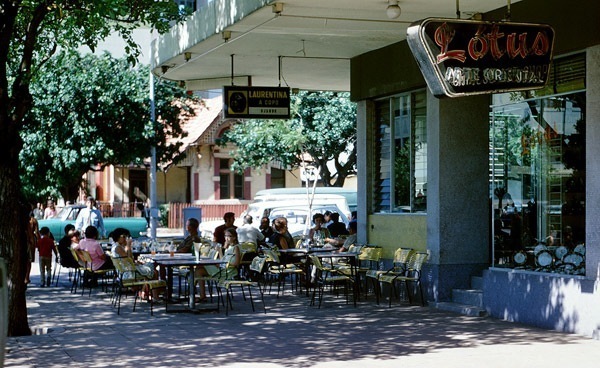
This cafe was my favorite hang out in Lorenzo Marques. I relaxed my holiday hours away drinking excellent latte coffee while I read, wrote or took in the passing scene. All seemed right in the world, but surrounding the port city was a two mile deep ring of urban slums where hundreds of thousands of impoverished people lived. The slow comfortable pace of life in the well-dressed and prosperous center of Lorenzo Marques was a false reality that history would overtaken by 1975 when Frelimo rebels would succeed in liberating Mozambique from the Portuguese Colonial government.
On my way here darkness found me at the border town of Nomahasha. Fortunately there is a Salesian School there that I had been told of so I requested to stay there (this is one good aspect about teaching for a catholic school, I will have stopping rights all over the world now.) The Salesians, Portuguese in this case, happily invited me in, gave me a comfortable room then invited me to a room where there was a table spread with a huge delicious Portuguese meal of rice, spinach and sardines direct from Portugal along with bottles of Portuguese wine interspersed among the breads and salads. Wine here is drunk like water, not for euphoria nor excessively, but just as part of the meal.
Anyway I’m trying a bit more to pick up Portuguese while I’m here. Again it is about 95% the same as Spanish as regards spelling and about 95% different as regards pronunciation. Yet I’m coming along in it and can get on better than in siSwati. The reserved nature of the Portuguese makes conversing rather difficult, but there are many soldiers in town due the war in the north and they are always ready conversationalist for some reason.
Manzini, Swaziland
18 September 1969
School has begun again and nearly one week has passed. I’m still a bit busy rearranging after the influx of machines and new hand tools. But I did do some preparation over the term break especially for my Form 2 Woodwork and Technical Drawing class for which I actually prepared an outline for the whole term.
My form 1 maths continues to tax me because it takes up so much time, but I reckon I won’t have that next year as I will when have three years of woodwork and drawing to contend with. The class has 36 students which is a bit large for my liking. Now that I have the machines in my shop, I’m undertaking to construct some 40 long desks and benches for a Salesian new rural primary school.
Summer is approaching and it is becoming hotter every day. The land is very brown, dry and dusty as we haven’t had but one or two inches in the last few months. Presently there are large brush fires every night as they burn off the fields – a traditional but poor agricultural practice. So the mountain sides are turning from brown to black.
But the thunder clouds gather daily. Last week I heard thunder for the first time since April or March. The plants and leaf shedding trees display a peculiar type of faith as they are already sprouting new buds in anticipation of the rains.
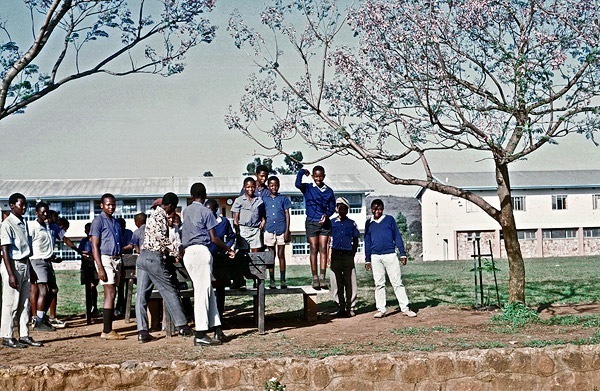
In this view across the central lawn of Salesian School, students play table football and mug for the camera. Several were my students. Some are out of uniform indicating that this is probably a weekend day. Purple blossoms adorn the jacaranda trees to the right and left indicating that rainy season has begun. Often jacarandas and other trees would suddenly begin to blossom at the end of the long dusty, dry season often prior to the rains.
Recently I discovered 20 Rand I had forgotten about so I was able to invest in two more safari suits to put me though the hot weather and classrooms. Another reminder of summer – the mosquitoes have reappeared. I must start taking my malaria pills.
Independence (1st anniversary) passed with a big celebration at the national stadium attended by 35,000 and Princess Alexandra from the U.K. and about 3,000 Swazi Warriors who performed a dance for the King (Sobhuza) and Alexandra.
The school swimming pool has been filled so my days ahead will be school with swimming pool to follow.
Manzini, Swaziland
29 September 1969
Spring has come and the heavens are split wide by thunderstorms and hail as we are having our third straight day of heavy rains. Trees are blossoming and the land is finally coming alive again.
By the way, thinking of the upcoming holidays, we should arrange a trans-Atlantic phone call. As the calls may be heavy at that time will probably have to book in advance. The cost is considerably less than I had expected – about $3 a minute. If we arrange I think it may be best for you to initiate the call as it is more confusing here due to language difficulties of the operators here. A number of volunteers have called without too much difficulty for $10-15. Inquire into rates from the US (one girl actually got through in 18 minutes). In any case if you ever need to call emergency number at the school is Manzini 278.
Things could be complicated however as I will no doubt be away for about a month from early December to early January. I’m getting about $300 of holiday allowance at that time. It will be strange to be away for Christmas with no snow or even cold weather.
I’m very busy – too busy – these days with an active term at school and increasing obligations otherwise. Soon I will start constructing about 40 seven foot benches and desks for a rural school. I have to wait for a lumber order from a nearby town in the Transvaal. I should be underway in another week.
This being the last term of the academic year also cramps me as I must close out studies in a variety of subjects. However, with this exam system it is easy to consider a course as a three year course rather than in one year blocks.
I am in difficulty with my form 2 boys in drawing. It is quite difficult for them and they lost almost all of last year so they are quite far behind. I fear many of them will not be prepared for the exams by next year.
My present situation here is allowing me to get ahead financially. By the time I get my holiday money I should be up to about R400 ($560) but I shall spend a good amount traveling as I plan to be comfortable this time.
Of course any holiday is subject to being thwarted due to border difficulties. Things may be brewing in the Congo again as a notorious Belgian mercenary officer of the Katanga days has returned to Africa.
Also I and a couple other volunteers are working on a petition condemning US-South Africa relations that if enough names are obtained could have unpredictable consequences.
Manzini, Swaziland
20 October 1969
I am living in a cloud. Spring has come and the clouds touch the ground frequently making the weather wet and drizzly – very English as I’m told.
The final school term is nearly half over already. I am busy but not as busy as in past terms. (Can it be that I have held a job for one year now?) Evenings are now filled with the building of school furniture for a rural school out on some mountain.
We’ve nearly completed the 20 benches and now are turning to the more difficult 40 desks. The new machines are performing quite well and all of the order has at last arrived. (As is common in business in this part of the world I have now received in four months what I was promised in four weeks back in June when I first ordered.)
Anyway the project is generally finished and I have allowed the embassy to release the payment check. Unfortunately, the young man who was trying to mount a motor on the jointer did not know much about its operation. When he tried to plane down a small piece of wood, the machine predictably kicked the piece back and his fingers plunged into the revolving jointer knives chopping off the tips of four fingers. I was not present at the time, but a long heavy trail of blood from the woodwork shop to the headmaster’s office told the story. Perhaps it served as a good safety lesson to the boys who were quite silent the next day when they say the blood trail.
(Later) I’m taking this day off from school as I have been ill for the past few days. It feels like a flu. Last night I checked my temp – 102 – so I decided to stay away for the day. I think it may be the sudden climate change. The rains are here. Last week it was a muggy 90-100 when it suddenly dropped to about 60-70 and has rained since Friday. Today’s Tuesday.
The weekend before last we had “open-day” at our school where parents we invited to visit the school. It was rather interesting to see the parents although most of the parents who came were middle-class types and few of the very poor student’s parents appeared.
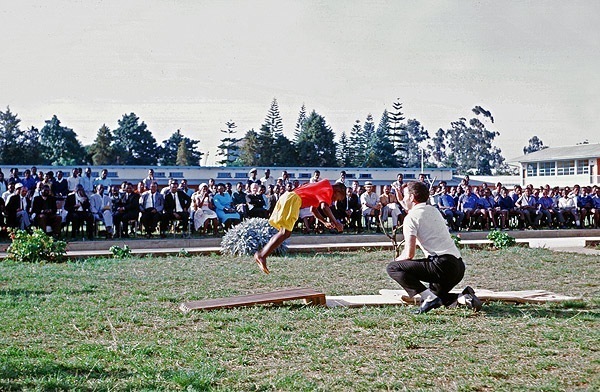
Parents, staff and students gather for an 'open day' in the center of the Salesian School compound. Brother Hugh leads a tumbling exhibition.
Salesian School was academically the most highly regarded as well as best equipped school for African students in the country, Consequently it was the school of choice for the children of the country’s small but growing middle class and members of the royal family who consequently would have constituted most of those in attendance shown here. About a third of the students were from comfortable means and many boarded at the school. However the Salesians took steps to insure that qualified students regardless of means were also included in the student body. Some had to walk several miles daily doing the trek barefoot so as to preserve their school shoes.
I took some pictures but mostly of the program which included traditional dancing, gumboot dancing, (a dance derived by the African miners of Johannesburg where they dance in their big rubber mining boots), a gym display and our high school band which now has uniforms.
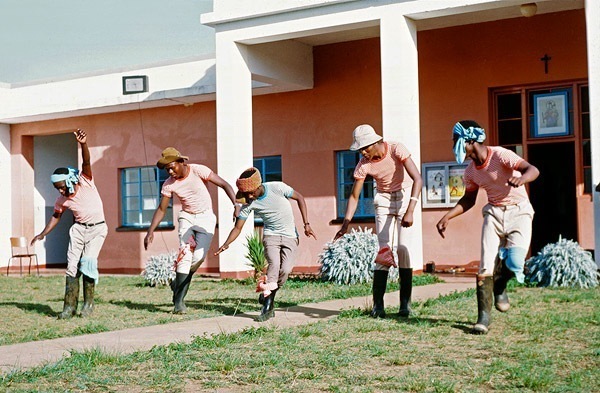
In an Open Day entertainment event, students perform a “Gum Boot” dance, a dance routine created by the African miners who worked in the gold mines of Johannesburg that featured wearing of knee-high rubber [gum] boots. Many Salesian students were from South Africa, their parents coming to Swaziland for the freedom and opportunities denied them by the Apartheid police state they left behind. Swaziland, a small country about the size of Connecticut, was surrounded on three sides by South Africa and a significant number of the Swazi tribe lived in the areas adjacent to the western border of the country.
I also took pictures of the school picnic which was a 16 mile round trip walk with a picnic in between (about three weeks ago). I walked 12 of the miles.
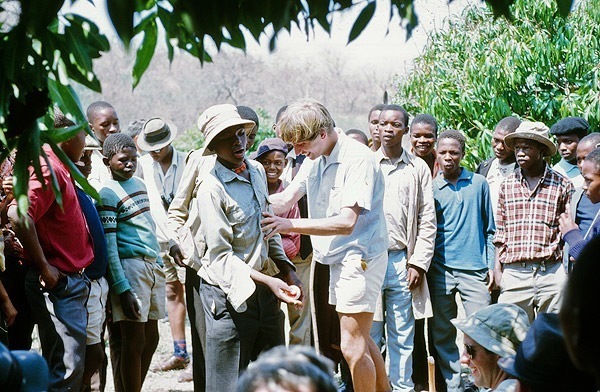
During the picnic that followed the hike, a yo-yo competition was held. Chris Lackey, who would be my closest friend and house mate during my stay, disqualifies a class clown in an amusing moment.
We’ve even played some softball. A group of volunteers played a school where some Americans some years ago apparently introduced the game. Now we are going to play some all black team from Johannesburg on Nov. 1 unless the South Africans interfere which they are known to do on anything inter-racial.
I am pleased with the results of the moratorium on classes against the War in Vietnam.
I’m hoping to organize some kind of anti-war activity against the embassy here for the 2-day moratorium next month. Most of the volunteers here are quite ardently anti-war, but lack of communications and transportation is the major difficulty as well as the fact that the moratorium days fall in the middle of our work wee. My current petition faces the same problem, but despite the slowness we have 25% of the volunteers signed and only one refusal so far. The others are just difficult to reach.
Manzini, Swaziland
12 November 1969
Not much remains of school – less than a month and I am eager to see it pass. I have a lot of things to do as regards school, but very little if any energy. The weather plagues me as it fluctuates by 40 degrees every few days giving me a nagging cold.
I guess I can hang on for another few weeks. I’ve already applied for a double entry visa to Mozambique which will allow me to get through Rhodesia and hence north. Where I go and how long I stay is uncertain. I only know I want to get away. I’ve lived within an 80 mile area for nearly a year now and I’ve never been in that small of an area for so long in all of my life.
Since you are persistent about my diet, I’m afraid I can’t give you any exciting stories about eating elephant, mangoes and avocados. Since I eat at the school, the foods are the usual meat-potato-green vegetable vitals I’ve always had. I don’t drink as much milk as I used to but otherwise it’s all the same. Unfortunately like all institutional food it sustains, but becomes terribly boring. The Portuguese Salesians certainly eat better. Yet beggars can’t be choosers as the saying goes.
Recently I invested $54 in a cassette tape recorder. If you buy one – (about $40 in the US) we can exchange tapes. These tapes play up to 90 minutes and the recorders are about 12” long 5” wide and 2” thick. I think they are the answer to car radios because they are easily transportable and you play the music you like which you can record of your record player.
Today the school was visited by some State Department men who supposedly were checking up on the US A.I.D. project. The were embarrassingly loud and indiscreet in front of the priests. Over tea one said that about 200,000 had massed in D.C. was causing him to worry. I replied that I had hoped 500,000 would show. This rather shocked him. He couldn’t see what good it did to march around the White House with candles anyway to which I more less replied that it was a better activity than having thousands of youth killed in Viet Nam for nothing.
The priests tactfully changed the subject at this point. Fortunately they people didn’t stay long after which the Salesians, Chris and I had a good laugh.
22 Dec 1969
Lusaka, Zambia
Just a note to let you know I am thinking of you over the holidays. Merry Christmas and best wishes for the new decade.
I am in Lusaka the capital of Zambia and if all clears, I will next head north for Elizabethville in the Congo.
I walked across the Livingstone Bridge at Victoria Falls the other day. The falls are quite beautiful.
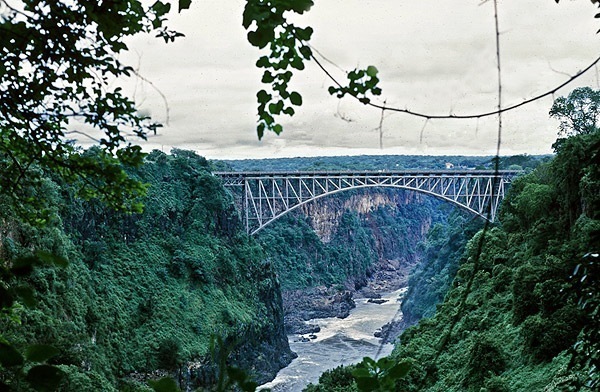
At the time of my visit the reigns of power in Rhodesia [Zimbabwe after liberation] had been seized by a small but powerful European settler faction which was not recognized by the UN, the US and almost all countries of the world. It was economically sanctioned and isolated. However with support of the Apartheid regime in adjacent South Africa it was surviving and thriving. It’s rebel opposition was weak and militarily outclassed. Its independence was ten years and many battles away. Recently independent Zambia, the former Northern Rhodesia, was ostensibly opposed to the settler regime, so there was no cross border bus, which is one of the reasons I walked the bridge. However one can see in this view of the bridge from the falls, why I would have walked, bus or no bus. You would have done the same!
I will spend some time there on the way back. Zambia is pleasant and quite advanced.
Had $40 stolen in while sleeping in a hostel in Salisbury, Rhodesia, but they were traveler cheques and will be refunded.
31 December 1969
Eastern Rhodesia
Today has been and is going to continue to be a poor day for hitching so I’ll pen this letter in the long gaps between cars. Presently, I am taking a hitching trip around Rhodesia and am stuck at the moment at a small town in the eastern mountain area having only made 40 miles thus far this day.
I believe I last sent you a post card from Lusaka, Zambia stating that I was hoping to continue to the Congo. Anyway those hopes were dashed as getting a visa proved to bothersome. I had traveled to the Copperbelt area of northern Zambia and the cities of Ndola and Kitwe which are only a few miles from the Congo.
I then turned back and ended up in Livingstone at Victoria Falls on Christmas Eve. Christmas Day was spent at the falls on both the Zambian and Rhodesian sides. I should have some nice color slides.
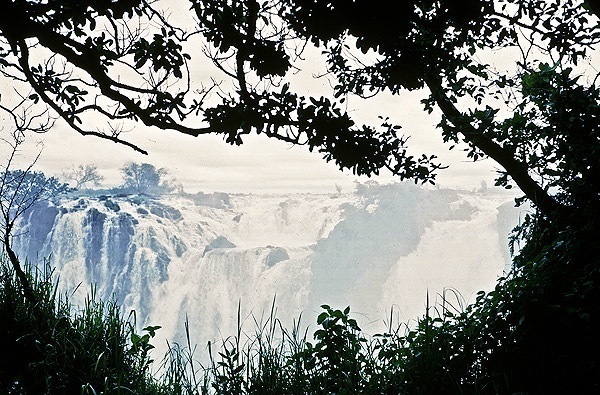
Victoria Falls thunder into the Zambezi gorge in a mile long series of cataracts. During rainy season, when I was there, the huge volume of water crashing 360 feet down into the narrow gorge produced large clouds of mist that make viewing the falls difficult and the bottom of the gorge impossible.
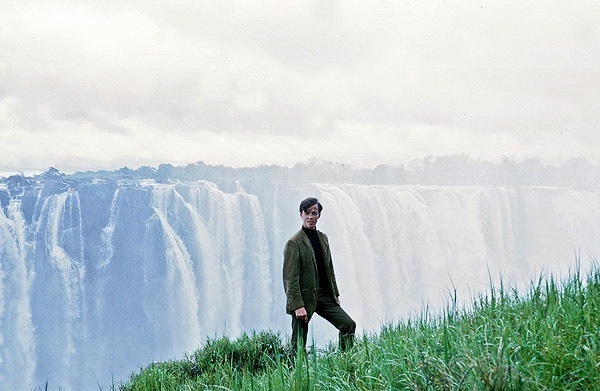
The next day I thumbed back to Bulawayo where I started my thumbing tour of Rhodesia that has taken me to Cecil Rhodes’ grave, Salisbury the capitol city, last night to Umtali in the eastern highlands bordering Mozambique and tonight hopefully, but pessimistically, to Fort Victoria and the Zimbabwe ruins near there. Then it is back to Bulawayo to catch my train back to Lorenzo Marques. I’ll stay there until my money runs out which shouldn’t take long.
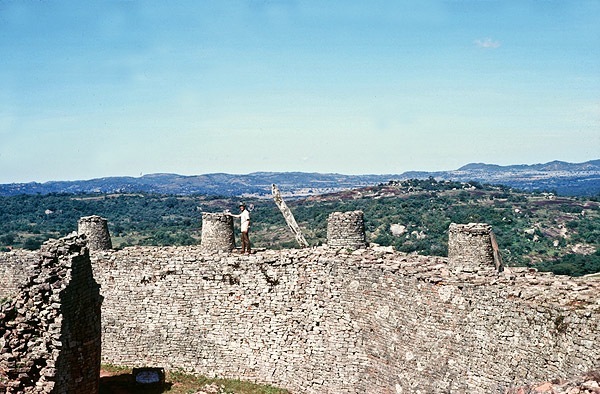
Atop the Ruins of Zimbabwe. Following liberation the new nation would adopt the name of this site as the country’s name.
All in all the trip has been quite interesting and revealing. Rhodesia as you may be aware is governed by a white regime that declared its independence from Britain about five years ago to prevent the country from being turned over to the black 10 to 1 majority.
As a result, the U.N. and most nations of the world are engaging Rhodesia with economic sanctions and boycotts – both of which are generally ineffective. Gasoline rationing is in effect, but there is plenty of gas and any other products one wants. The store shelves are full and the economy is bustling such that the sanctioning of Rhodesia is a myth.
American products are plentiful as well. Zambia (formerly Northern Rhodesia) is an independent black nation attempting, with great difficulties, to go its own way free from big power and South African domination. Although sworn enemies of the white regime in Rhodesia, Zambia is the biggest violator of the sanctions as she is the biggest purchaser or Rhodesian products. There are some skirmishes occasionally between Zambian-backed militants and Rhodesian troops, but they are minimal and only in the lower Zambezi Valley. The militants thus far have been badly outclassed by a small but efficient Rhodesian army.
Yet Rhodesia remains a pleasant enough country to visit and the level of segregation is slight but, unfortunately, increasing as the sanctions drive the country further into the South African sphere of influence.
(Later) After about a four hours wait in a burning sun I got a ride to Fort Victoria. I was actually quite lucky as it was getting toward 3 PM. Anyway I’m comfortably settled in my hotel. I think the trip to Bulawayo will be considerably easier tomorrow – shorter too.
You would quite enjoy hotel service in this part of the world both in price and service. The rooms and interiors are generally old but always very clean. For instance the hotel that I am in at the moment cost me £2-4 about $6.00 and this includes supper, breakfast and wake-up tea or coffee delivered to your room whenever you like. This place is a bit more expensive than others because the price includes supper. Usually the price only includes breakfast. The service is always super and friendly.¨
I have purchased some excellent wood carvings in Zambia and hope to send them home from Lorenzo Marques since there is cheap postage there. They are five carved heads about ½ human head size.
Well, the 60’s will end in 6 hours here 14 hours there. Let’s hope the seventies will be as good to us as these years have been. Happy New Year.
Manzini, Swaziland
2 February 1970
Teaching is back in full swing now. I find myself teaching 33 of 40 periods again this year, but it is all technical drawing and woodwork (no maths) so it is not so bad. As usually I am behind on my planning and preparation but I’ll pull ahead in a few days. Only the hot weather makes things difficult.
Life remains quite normal and regular so I have little to add. I may be getting a beat up car or motorcycle before long if I can find anything for $150 or less. I’m a bit ahead financially and a bit tired of being without transport and thus all the mercy of the wild drivers in this country when I hitch. I’ll have to see what happens.
Manzini, Swaziland
18 February 1970
School and rain continue steadily and what had started out to be a hotter year has cooled considerably with the constant rain.
Chris and I are having a bit of a row over housing. We have become impatient with our current place and are asking for parity with the other teacher’s here because we are getting rather depressed living in single bedrooms that are far from being up to the standards set for volunteer housing. Anyway a resolution should be in the offering as we have made it clear that we are no longer willing to live in the same situation. We shall see by the end of the week.
I have received a letter from Nils Johansson in reply to a post card I sent to Sweden some time ago. He has extended an invitation to stay at his place during my travel next year. He also sent a couple of pictures of his two sons which are 17 & 19 now and can speak English. I’m quite eager to visit Sweden.
Right now I’m sitting in my drawing class – Form 2 – as I have the period to use as a work session. Generally the classes are proceeding quite well this year. My teaching load is the same in periods but lighter due to the fact that there is not much now preparation for half of those periods as I had them last year.
It is track season here so the boys are busy training for the big inter-school meet in March or April. I’ve built some starting blocks for the sprinters. Although we will be a bit weaker than last year I predict we will win again as we have in the past few years.
The academic results for Form III have been pleasing. Salesian got 6 of the 11 first class passes in the country. We are still awaiting the 0-level (Form V) exam results. These results usually determine who goes to university and are therefore quite crucial.
Manzini, Swaziland
20 February 1970
Time passes swiftly now and I am finding little time for anything else as I work from 7 am-8 PM. everyday. However I am gradually finding the short cuts.
I’ve formed a circle of chess players which offers quite a variety. I can’t remember if I’ve told you. One player is a Dane who manages a pineapple factory, another is a Dutchman who has lost $14,000 in 18 months at the gambling casino nearby, and the third is an Austrian who catches crocodiles and deadly snakes barehanded (the deadliest snakes are the mambas – black and green – which kill in 5-20 minutes after striking). They are abundant here and occasionally are killed here in town.
It is not raining as much now and the whole are southern Africa is suffering from drought. The corn crop which is the dietary base of the poor is in danger unless torrential rains come in the next week or so. The country is still green but not as green as it was previously.
My radio is working fine. Most of the programs I listen to come from Johannesburg or Lorenzo Marques in Mozambique. They play about 80% American tunes and sell about the same % of American products. However they bounce back and forth in English, Portuguese and Afrikaans (South African Dutch).
My students are generally quite bright, but can get playful and noisy at times warranting an occasional standing in the corner or a neck pinch, but discipline is no serious problem for the students are still aware of the privilege of education that at this level is only a blessing for 30% of the nation’s kids.
The Salesians are a very tolerant and efficient group to work with. They don’t interfere with my life in the least. It is unfortunate that the Nazarenes, who are about as strong as the Catholics in this country, can’t learn this from the Catholics so that they could get volunteers for their schools. However, no volunteers are willing to put up with their meddling and demands.
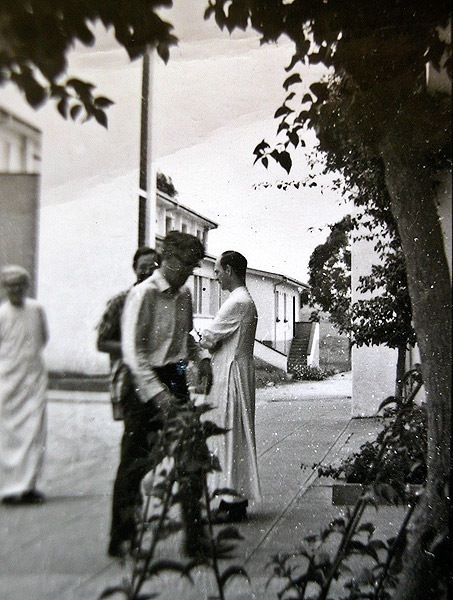
The Salesian priests and brothers, four shown here with the church in the background, who operated the high school and outlying elementary schools alternately wore white robes and street clothes. Father Summers, foremost above, was the priest with whom I had the most contact and conversation. Almost all were Irish and had a tolerant spirit that kept their eye on quality education. When I told them I could not in all honesty lead prayers as was the tradition for teachers in the first class of the day, they did not blink and arranged for one of the students to do so. They were hard-working, dedicated, and patient with my sometimes youthful impetuosities all for which they earned my utmost respect.
My R58 is proving to be more than enough for a month ($81). We are still living in the same house and as we will apparently remain here for some time now I hung some drapes finally, made from African pattern cloth, bought expensive sheets for my bed and a 7’x4’ straw mat for $1.20 my bedroom floor. Peace Corps is supposed to provide us with a couple of small refrigerators shortly. It is rather difficult to get by without one and electric appliances are sky high here – a tiny fan costs $14.00!
Citrus fruits are becoming more abundant now and pineapples are back in for their second season. At outside markets huge 12 inch height pineapples go for 6 cents apiece and are fresh and really sweet.
Manzini, Swaziland
1 March 1970
It is a hot Sunday and March has come roaring in like a lion. After a sweltering day, a brief violent thunderstorm broke at sundown – one of the loudest of the summer. It subsided quickly leaving us the simultaneous spectacle of a rainbow, lightning chains, and a brilliant sunset.
School enters its second month and Easter with its 10 day break is only 3 weeks off. We get 10, no 11, days off as the Salesians have been spiritual exercise or something during that time.
Things have happened. The battle for better housing has gone well and tomorrow Chris and I move into a pleasant 3-bedroom house in the teacher’s housing row. (Most teacher housing in the country is provided for.) Naturally we are pleased.
Secondly, I have taken the $300-400 that I have carefully saved over the past few months and purchased a motorcycle. I bought an 80 cc Suzuki trail bike for R200=$350. A trail bike has an additional large sprocket to which the drive chain can be transferred for gearing the bike for cross country riding as well as having cross-country wheels and other attachments.
Although the purchase may seem a bit wasteful I needed it rather badly to break myself out of the boredom of being forever in Manzini. The engine is small, but the limited speed of 40-50 MPH is more than I need.
Saturday, I took it for a break in ride. I turned off the main tar road to Stegi and took a dirt road down to the bush veldt. After about 8 miles in that rather scenic road I turned back satisfied with the performance. About two miles later I took in a 2 ½” nail in my rear tire that punctured the tire irreparably in about 15 places.
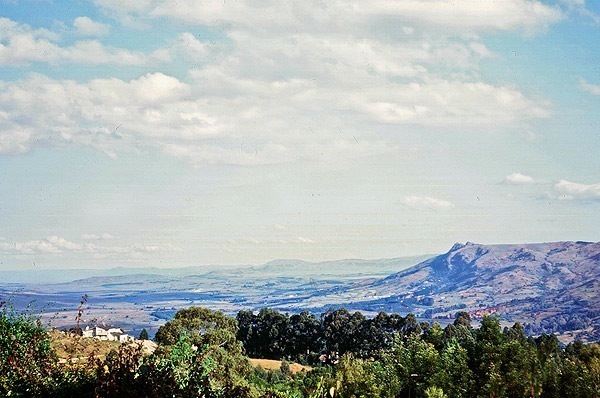
My little trial bike motorcycle freed me up to explore the back roads of Swaziland. This view looks from the ‘high veldt’ elevations near the capitol Mbabane down into the ‘middle veldt’ where Manzini lies. The twin prominences on the right were dubbed ‘Sheba’s Breasts’. Swaziland was a series of geographic steps called veldts, from Afrikaans for field. The elevation range from over 6000 feet to near sea level in the low veldt, making for a wide range of climatic and biological diversity for such a small country.
It was my good fortune that a pick up truck passed five minutes later and returned the bike & me to the tar road where I turned on the engine and let the bike pull while I walked 3 miles to a petrol station where I tried futilely to repair the inner tube.
After that failed I got a lift with a Swazi Nazarene minister back into Manzini. I’ll have to buy a new inner tube tomorrow – such unfortunate luck, but I did learn how to do the operation of changing the tire.
Manzini, Swaziland
15 March 1970
My motorcycle is now 250 miles old and it is running quite well in spite of some difficulties at the start-two flats in the first 80 miles. The electrical system is messed up, but the warrantee will cover that free of charge. Today I went riding with a French-Canadian friend [Guy Renaud] who is a free-lance volunteer.
We went up into the Usutu forest – purportedly the largest man-made forest in Africa – to a waterfall about about 4-5000 feet up in the mountains. It was a small waterfall in terms of the amount of water but the drop was about 100-150 feet. From our position at the top of the falls we could see Matsapha, Luyengo, and Manzini in the big valley below us. Manzini was about 20 miles distant. It was pleasant to escape to the fresh pine scent of the forests. Up in the mountains it is reminiscent of both the pine forests of Michigan and the high mountain meadows of the Rockies. Later we drove down into the valley to hot springs on the Usutu River.
Last week, I found (was shown) a series of cataracts high up in the Royal Mountains above Matsapha. The first cataract was about 30-40 feet high and dumped a considerable amount of water into a beautiful natural swimming pool of 20 yards in diameter. As the water spilled down the mountain it forms a series of clean pure pools.
It is quite uninhabited thereabouts as well. Getting there on motorcycle is a challenging scramble along footpaths, across a shallow stream and up the mountainside. We got within five minute’s walk of the cataracts by motorcycle.
The motorcycle has proved quite fun. I’m now hoping over the 11 day Easter break to take a motorcycle trip around the perimeter of Swaziland using the outermost roads. All I need is someone with a motorcycle to accompany me of whom I have a couple of good prospects. The idea would be to camp or stay in Swazi homesteads taking about for to five days for the journey.
Manzini, Swaziland
25 May 1970
School is back in session. It should have been a difficult term but it seems that it isn’t and my evenings are empty. The lethargy of the holidays is slow from removing itself from my body and all those things that I would like to do have been put off (as usual). Ah, but Swaziland is so quiet, so peaceful, so forgotten.
My interest in chess has regained it keenness and I and another are busy reorganizing the local chess club meeting now at my place on Thursday nights. We are 10-20 now and hopefully will organize a tournament at the Holiday Inn before long as well as arrange some team matches against the Lorenzo Marques chess club.
My motorcycle is 2000 mile old. Peace Corps has not uttered a word of protest and now after my guinea pig existence a number of other volunteers are getting vehicles or considering doing so. Mine runs well although it is a bit sick at the moment. I think the new spark plug I put in it will help it recover. It delivers 80-100 MPG which is a country where gas is 56 cents (US) a gallon is a good bargain.
Manzini, Swaziland
9 June 1970
The days are short and the evening are crisp requiring occasional help of an electric heater. The daytimes are sunny and dry and the countryside is become its winter gold and brown.
A long weekend has just passed with Monday being Commonwealth Day or something. I went riding in the mountains for two days and about 250 miles of torturous climbs, grand views and rugged rivers.
On one day I took an 90 mile trip looping north to Mbabane through untraveled and sparsely populated mountain and valley region.
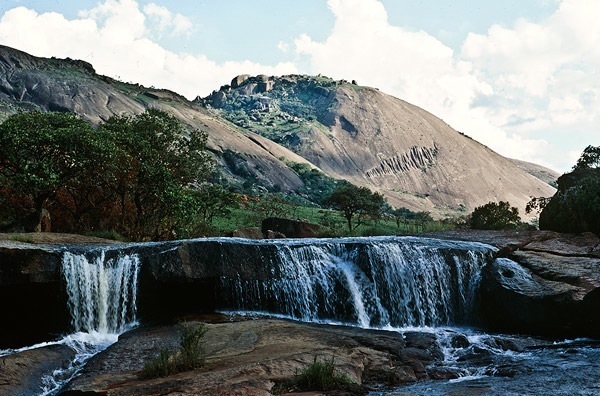
Along this tour I paused to take this picture of Sibebe Rock, purportedly the largest rock in the world after Ayers Rock in Australia. In 1996 a created a early web tour of a ride I was to repeat. It was titled “Manzini to Mbabane the Hard Way” and can be viewed at www.bhere.com/swazi.
The following day took me up to the area of the largest mountain around Piggs Peak. I went from about 1000 feet to well over 5000 feet. The change was similar to going from semi-arid desert to suddenly driving into a northern Wisconsin lumber and pulp town. In the Piggs Peak area there is about 200 square miles of man-made forests used for lumber and pulp. It is the first time I have been in that area and found that the views and mountains were much more dramatic than elsewhere.
Manzini, Swaziland
21 June 1970
21 June – summer for you, winter for me. The day was far from winter as it was a brisk 70 degrees. I and another volunteer spent the day climbing in the mountains about 10 miles from here. We started from the point where I was shown waterfalls some time back. This was the series of cataracts I mentioned sometime back. We followed the river up the canyon it had cut in the side of the mountain and discovered that it made several more waterfalls of 20-40 feet.
In the canyons, it formed rain forests filled with lush tropical vegetation. Not a human was seen. We did see an antelope. The river and rain forests continued for about two more miles beyond our turning back point. The short days prevent our going further. I hope to do some camping some time later in this area perhaps next weekend as it is a long weekend.
Night here get to a chilly 45 degrees to 55 degrees and lower in higher up elevations. I sleep under three blankets and the electric heather is working full time most evenings.
The school term is a third finished already. My students progress, but the Form 3 students are slow and progress painful at times. This is particularly true in technical drawing while advances in woodwork are noticeable with the improved quality and complexity of projects that are completed.
Corner tables, coffee tables, small cabinets and book shelves are prominent projects. They work quietly and industriously. But technical drawing! Most of my students only seem to have an inkling as to what it is all about. Their faces are frequently screwed up and puzzled. Their teacher is occasionally frustrated at their seeming opaqueness. But when this term is finished I shall coast downhill toward December and the end.
My interests in studying have reappeared and suddenly I wish I were going back to school. But the urge will remain unsatisfied. I think Fall 1971 is a good time to reenter. After some correspondence I know that I will be able to re-enter University of Michigan graduate school with no difficulty. The break from studies has allowed me to integrate many of the ideas to which I was introduced during my university studies. I will reenter with much firmer footing and with a genuine desire to study and learn and produce.
Manzini, Swaziland
12 August 1970
My last holidays start in two days. As I am unusually weary of school, they are a relief. I’m happy my tasks of teacher are ending – I could never be a high school teacher the rest of my life. After the first year it begins to become repeated motions more of a machine rather than a teacher. For high school, the students are too attention demanding – primary school must be unbearable.
Spare time is saving me because I’m enjoying my spare time more than ever. If I could only live here and not have to work! Or if I could have an individual and interesting job.
The environment here is so peaceful and restful. I enjoy taking full day trips out in the country-side and into the bush and mountains. Usually I take a lunch and a book. This is the first time since I was quite young (and I stayed out until dark) that I really enjoy this outdoor activity. I bought a pair of eight power binoculars quite on impulse. I decided I wanted them one day and spent $25 the next. They added a lot to my days out particularly with the variety of birds here they are helpful.
The past two months have given me a period of mental activity that I haven’t experienced in years. I’m suddenly very eager to re-enter school. I’ve even considered skipping Europe to go back in January, but I’ve decided that it would be too rough and fast. But I am still eager. I’ve been stirred into undertaking a heavy diet of reading and collecting ideas and research type problems that I want to study.
When I left school in 1968 I was thoroughly dulled because I was approaching school too much on a knowledge factory basis that I was there to get a degree. Classes were generally more important for credit than content.
Now that I’ve turned this value set around content is all I practically care about. The ‘degree’ means much less to me now that I can envision several more years of study to absorb what I want to know and feel I need to know.
Ekukhanyeni, Swaziland
23 August 1970
Ekukhanyeni (the ‘place of the light’ in siSwati) should have its name changed to Ekumoyeni (the ‘place of the wind’). In any case I’m spending a few days of my last school holiday out in the traditional countryside at a place of a friend of mine. Chris is here, too, painting pictures and, like myself, occasionally strolling out into the very quiet peasant countryside. For once I shall stay at home, in the country, on a holiday. I will go to Lorenzo Marques in later November to play in a chess tournament. Otherwise it will be Swaziland all the way until the big silver bird delivers me in December.
It is house-making time here and in the rest of traditional Swaziland. The head-high grass which has been cut and dried is now being skillfully woven and thatched into neat rows. The women do this while the men and boys cut out sod, squares which the fit into wooden frames cut from the forest and assembled in a variety of shapes. This is then covered with mud resulting in neat and solid little dwellings.
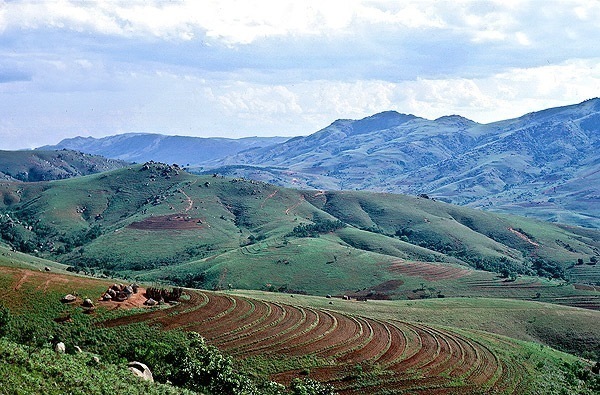
Before coming to Swaziland I had been in school continually for nineteen years. Knowledge poured in but little time remained to put it together and understand it. My tiny motorcycle gave me the opportunity to escape into distant countrysides where I discovered several ‘contemplation stations’, places where I sat and contemplated, overlooking dramatic vistas that inspired ideas and provided peace of mind. At the time I wrote these letters I was unaware of the change my experiences were bringing within me. My full intention was to return to the academic life and my plans for that aim dot these letters. Yet, after returning, I would toss away a full graduate school scholarship and, as I would say to myself, ‘Quit school forever and be an artist.’
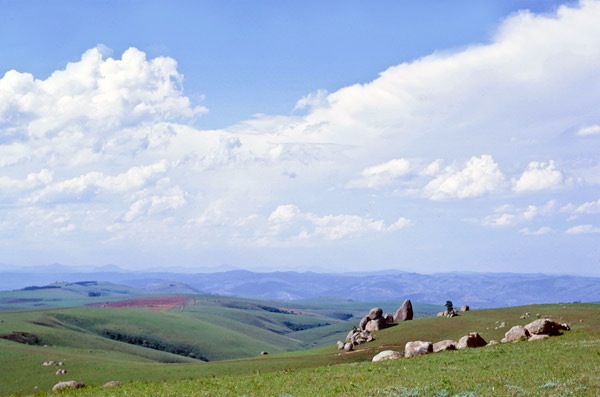
My favorite contemplation stations were atop those background rocks. They crowned a high point called Malendela. From there I could see 40 miles or more in any direction and gaze down into the idyllic Mtombazani (Little Woman) Valley shown in the cover image.
Last week I spent a good deal of time riding up into the mountains where I found a few very isolated valleys where with my binoculars I’ve been taking time to observe the traditional life style. Here at Ekukhanyeni I observed it more directly, but the effect is different since the behavior is altered by the presence of a stranger.
I have become aware of one striking difference between our life styles that I was some how not aware of until now. The traditional Swazi here have a very direct and intimate relationship to nature. Of most of the things they use and consume, they know the origin. The know that they grass for their thatched roofs comes from ‘across the river’ or that the wood for their houses and fires comes from a nearby forest. Their water source is directly received and known. Many of their tools, clothes and all of their food comes directly from the earth, plants, and animals around them.
For us it is so different. The food we eat which becomes our body is almost always from an unknown source. Likewise our possessions and houses and the materials used to make them are of unknown origin to us. In fact we know only facts about the food, which is us, and our prosperity, which is part of our being. Yet we rarely experience this knowledge. We only know indirectly what we are.
Living in urban western society has completely cut our roots, at least mine, from the earth which is the source of my body. Here they worship rain because rain is water and water is life. It’s quite simple compared to our complex and almost rootlessly abstract religions. Obviously a water tap cannot have the meaning of a thundercloud. But they live on here in a most happy but difficult poverty. So it is both good and bad.
Manzini, Swaziland
Sept. 1970
I’m still undecided about what I’ll do in December: Germany or school. I’m going ahead with preparations for both. I’ve applied for a residence – work permit for Germany which should be easy to come by. Whether I go to school in January depends on what I find out about two programs that I’m investigating.
One program is a Ph.D. program sponsored by a 17 school consortium headed by Antioch College. The program is one where the student may design his own program of study and use the facilities of any of the 17 schools. The other program is run by a Fairfield University in Connecticut. The program, run by the graduate school of political and corporate communication, studies frictions between diverse groups that block understanding. The program is run through a grandly named ‘Center for the Advancement of Human Communication’. Nevertheless, its aims and ideas are progressive and ambitious. It is a masters degree program, but has the general direction in which I’m interested for future studies.
So I find myself faced with what psychologists label an attraction-attraction conflict. Germany offers the valuable asset of another language and more time to read things I need to read. Yet if I go there, I will have to work, so I’m not eager abut that idea, particularly as I will have enough money to go for a year in the States. After another year of studies, I’ll be in a good position to get some form of working support. In case I come to the States immediately I will spend about a month at various places en route.
My spare time has been filled with reading primarily in the field of social thought, philosophy and psychology. I found that the Salesians have six volumes of Toynbee’s Study of History so I’ve now waded into this massive work, but doubt if I’ll read all 12 or 13 volumes. This country is ideal for outdoor reading and I’ve spend days deep in the mountains reading and looking through my binoculars. It’s a most pleasant existence here. Pity and blessing that the time is coming. In another month, half my classes disappear. I’ll be laughing and romping.
3 September 1970
Manzini, Swaziland
These holidays – only three weeks this time – have already approached their last weekend. Next term is exam term. Half my class, more than half actually, disappear partially from the start and completely at the first of Nov. I finally got a sample woodwork exam (last year’s exam). It is much easier than I had suspected and if all the boys don’t get good passes from woodwork, it will not be my shortcoming.
Last week I motorcycled 40 miles north to see the Reed Dance, Mhlanga in siSwati. This is a traditional festival where thousands of young girls gather 12 foot+ reeds in bundles for the Queen mother. The essence of the dance is something of a fertility ritual. The girls are colorfully but scantily clad in a two inch wide ‘skirts’ which is strategically placed in the front side but inadequate on the back side. They also wear beaded anklets, necklaces, feathers, and blow whistles. Its quite an exciting event for the girls and the biggest traditional even after Incwala.
Naturally the more conservative missionaries view the whole thing as ‘pagan’ in view of the amount of epidermis visible. The Swazi’s claim that it is an annual affirmation of chastity on the other hand. So I guess the morality of the event is in eyes of the beholder.
It is Independence Day time again this year. They have a show (like a fair) here in Manzini every year. The American display of course features moon rocks. (Whoever said the Space program was not a political propaganda technique. Every American display I’ve seen here emphasizes the theme.) The piece of moon rock will be an attraction albeit it could be a stone the charges de affaire picked up on his way to the display. But the people will marvel nonetheless.
I’m in contact with Univ. of Michigan to which I planned to re-enter in fall 1971 and with a small university in Connecticut which is offering an interesting graduate program though a center they’ve developed called the Center for the Advancement of Human Communication.
Manzini, Swaziland
3 November 1970
Time has suddenly become very short and the end is only a month off. Last weekend was spent in Lorenzo Marques. I skipped Friday but it was scheduled as a mid-term break day although our school was open anyway due to taking a long Easter break.
Tomorrow is the last day of heavy classes for me as exams start the day after and 18 of my 33 class hours go away. Otherwise I start packing up loose ends and go to Lorenzo Marques once more (at the end of Nov. for a chess tournament) and then leave on Dec. 7 for Europe via Nairobi, Addis Ababa, Cairo, Athens etc. The Dec. 11 flight was filled so I had to take an earlier date.
I will be sending home my Peace Corps trunk with its allotted weight of 100 pounds of my assorted junk. I’ll be sending the keys to you as the trunks may be required to be opened for the customs officials.
A Peace Corps woman volunteer who is staying on has agreed to buy my motorcycle so that load is off my mind and I’ll still have the bike until late Nov.
We were a part of the 50 member Swaziland 1, the first Peace Corps contingent in Swaziland but not the first volunteers or volunteer organization. When we arrived in the country it was with typical American grandness and we more than doubled the existing volunteer population. However we quickly became friends and colleagues with volunteers from other countries.
![Swaziland 1 volunteers at reunion May 2013 Manasota Key, Florida. Phil Peters and Jennifer Gill. First Row: Tom Wentzel, John Underwood, Steve Hank, Fred O'Regan, Lowell Boileau, John Catanese. Back Row: Bob Spigel, Cliff Sears, Jim Morphy, Chris Matthews, Mike Ascolese, Sue [Gray] Spigel.](images/swaziland-1.png)
Swaziland 1 volunteers at reunion May 2013 Manasota Key, Florida.
L-R Kneeling: Phil Peters and Jennifer Gill.
First Row: Tom Wentzel, John Underwood, Steve Hank, Fred O'Regan, Lowell Boileau, John Catanese.
Back Row: Bob Spigel, Cliff Sears, Jim Morphy, Chris Matthews, Mike Ascolese, Sue [Gray] Spigel.
In Memoriam Fred Schwartz
One of our group would not survive Swaziland. Fred Schwartz, a warm and affable volunteer, was tragically killed in a motor vehicle accident. The break from academics allowed me the opportunity to follow my passion for art. I started painting. Fred sat for this portrait with his thick red beard and green army surplus shirt shorty before his passing. Swaziland 1 Tribute site for Fred.
I sold my motorcycle to Jennifer Gill, one of our volunteers who decided to extend her service. She is seen here viewing pre-historic rock paintings in Rhodesia. I had taken the train from Lorenzo Marques to Bulawayo with her and fellow volunteer John Cantanese during Christmas holiday break in 1969-70. Like almost all us volunteers she was passionate about travel and discovery. We became friends during our training days outside Baton Rouge, LA and hitched hiked together to New Orleans on a couple of occasions.
I wish I had taken more pictures of more of volunteers. They were brilliant and kind and have gone on to do much good in their lives and made a better world.
John Catanese was one of the few in our contingent who became fluent in siSwati do to his isolation in the Grand Valley where. When I visited him, he knew all the beautiful spots and vistas. John had great rapport with the locals where he was posted. In the following fabulous film clip by Steve Hanks [packed with great shots of Swazi traditional culture] John can be seen sharing a bowl of tshwala [traditional beer] about six minutes in.
Our most famous alumnus was Chris Matthews who would go on to be a speech writer for Jimmy Carter and an advisor to Tip O'Neil before becoming the long-running rapid-fire host of CNBC's "Hardball" show.[He spoke just as rapidly back then, if not more.] Chris served as a small business consultant and was captured in this clip by Steve Hanks.
There even were South African volunteers. They were anti-Apartheid youth from non-governmental agencies in Cape Town, which was the center of a small but active white opposition to the regime. One of these was Ingrid Hulscher, shown below, who worked with rural nurses. Thanks to Ingrid I learned much about the politics and culture of South Africa, from which we Peace Corps volunteers were regrettably banned by the Apartheid regime. She even taught me how to cuss in Afrikaans. The volunteers of all countries intermingled in our tasks and outside. All were adventurous and creative which made for great fun, great parties and great memories.
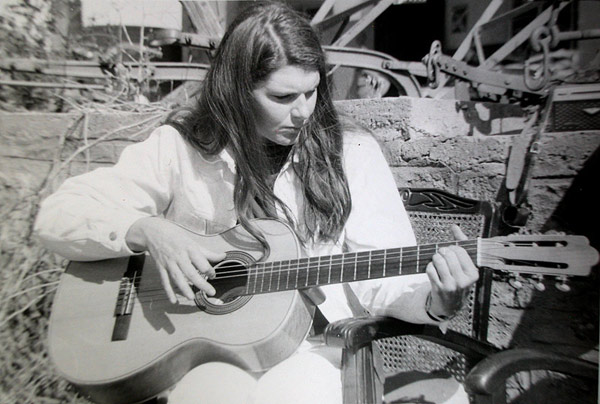
I’m a bit bogged down in my application for a work and residence permit for Germany and may instead take care of that when I arrive in Munich. I am applying for the graduate program at Fairfield Univ. that I mentioned earlier. I have more details on the program and it sounds quite solid and is what I want. At the moment I think I will go there next Sept. if all works out well. The classes for this course are in the evenings so I could work daytimes as needed to pay up loose ends. I hope to return to Michigan following a time of study at Fairfield. Fairfield is on the Connecticut Long Island Sound near Bridgeport and 50 miles from N.Y.C. Nice location.
Manzini, Swaziland
17 November 1970
It’s about a month to go – more or less. I don’t think I’ll be leaving until 23 Dec. now or even later – our traffic is a bit heavy between here and Nairobi. Also I’ve changed my plans a bit. I’ll be skipping Ethiopia and flying into Tel Aviv instead.
After a long discussion with a friend of mine who spent seven months at an Israeli kibbutz (collective farm) I am considering spending some time myself. Anyway it is such that one who gets to Israel on his own can get set up in a kibbutz and for six hours labor a day gets free room & board.
As it is non-contracted one can come and leave whenever he wishes. Since it doesn’t cost me any extra to stop off in Israel, since I’m not overly eager to get into harsh winter weather immediately, I can’t see how I can lose anything. Now that the Middle East is quieter I have more incentive for this idea which I had considered a few years back.
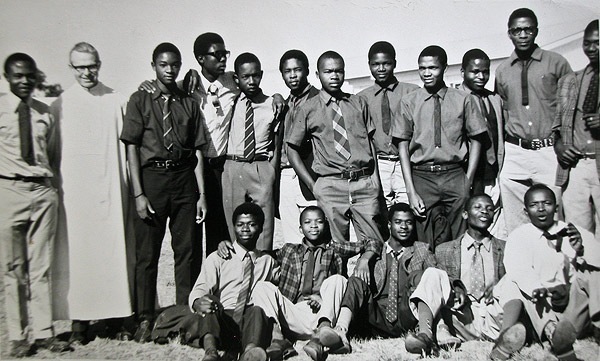
A group of my upper class students. This was taken the year after I departed and sent to me by Simon Ngonyane, sitting left most in the front row. To his right are Solomon Dube, Isaac Mabila, Absalom Hlanze, and Rupert Khumalo [the student who put the chisel through his finger]. Back row left to right are Shadrack Gwebu, Father O’Dea, Isaac Dlamini, Humphrey Mkhwanazi, Andrew Dlamini, ?, Daniel Thwala, ?, Isiah Zulu, Petros Nsini, Simon Myeni, and Idesbald Dlamini.
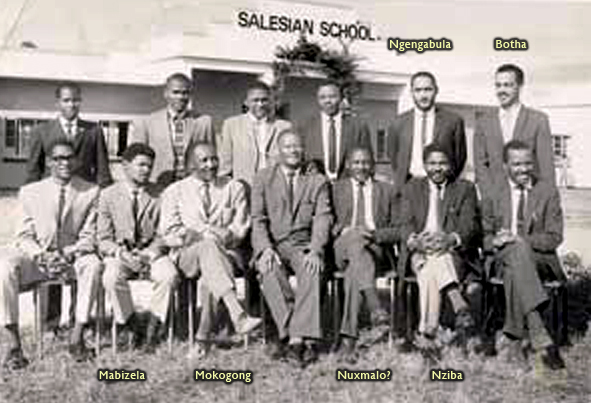
The nonclerical staff of Salesian School. Photo from the year prior to my arrival. Source the Salesian School website. I cannot speak highly enough him and the staff and priests who taught at Salesian and feel honored just to have been a minor player among them.
Ken Ngengebule, back row second from left, became a good friend over daily staff room card games and chess. He taught me the exciting 'Viet Cong' Casino card game, patiently mentored me in dealing with the Salesian culture, was a brilliant chess player and a good natured, always helpful person. 'Rams' Ramokgopa, not shown above, was another teacher with whom I became well acquainted. He was my card partner, also a good chess player and friend.
I only learned the extent of the political activities at Salesian years later with the publication of Number 43 Trelawny Park - Kwa Magogo where Stan Mabizela, Rosette Nziba, Humphrey Mkwanazi and other Salesian students and staff are mentioned and where the school is described as a hotbed. It made me very happy to learn of the roles Salesian students and staff played in the liberation of South Africa.
Swaziland was quiet and bucolic during my days there. The liberation of South Africa, like the Berlin Wall falling, seemed like an impossibility in our lifetimes and Nelson Mandela doomed to die on Robben Island. The violent events of raids by South African commando death squads, bombings and assassinations as the liberation war spilled over into Swaziland were still a decade away but the seeds of the resistance were well-planted and growing.
Stan Mabizela was in political exile from Apartheid South Africa and an ANC member. Rosette 'Hlube' Nziba, also an exilé, was a key figure in the ANC's rival liberation organization the PAC. According to 43 Trelawny they were friendly as they were both focused on the common foe. Nziba was my next door neighbor in our row of teacher houses. Next to him was Mabizela’s house and they got along well. As I was both highly interested and sympathetic their cause Mabizela and Nziba shared stories with me about their political imprisonments in South Africa. Understandably they did not and could not tell me about their recruiting activities in Swaziland.
Personality-wise they were opposites. Nziba was energetic and thundering. He looked, acted and exuded the aspects of leadership. He. could be both fierce and understanding. If you ever had to go into battle he’d be the person you would want in charge. He was a very popular mathematics teacher. Sadly he died a few years after my stay and never got to see the promised land for which he had fought and suffered.
Mabizela was gentle and professorial and judicious, quietly smoking his pipe, seemingly immersed in thought. He told me how, instead being victimized by the notorious prison gangs, he became respected and protected once they learned for what he had been unjustly imprisoned. His character was such that he would be chosen to adjudicate inter-gang disputes. As 43 Trelawny cites these skills came into play to settle disputes that would later arise among resistance factions.
Mabizela would play a major role in ANC activities in Swaziland along with future South African Presidents Thabo Mbeki and Jacob Zuma. He would negotiate their release when arrested by Swazi police following a confused shootout between the ANC and Swazi Police in 1980. When the ANC was expelled from Swaziland following an accord with the Apartheid regime in 1982, he continued the struggle from Tanzania and Zimbabwe. He passed away in 2003 while serving as liberated South Africa’s first High Commissioner to Namibia. One of my fond memories was his darling son Vusi shown below sitting on the stoop in front of my house.
Humphrey Mkhwanazi [Xolani Humphrey Mkhwanazi], shown in student group above, was a brilliant student of mine who would be recruited into the ANC resistance by Stan Mabizela. He would graduate from Salesian, go on to obtain a PhD from the University of Lancaster in Britain and then return and risk it all by playing a dangerous and key role as a courier for ANC operations emanating from Swaziland. Today he is a renowned mining industry CEO.
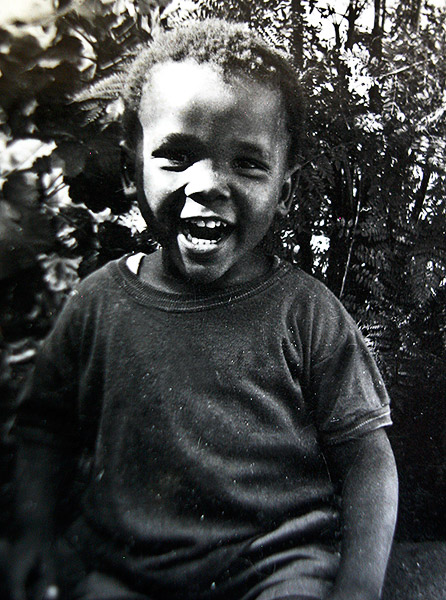
I am very busy these days even though I have next to nothing as far as teaching periods go now that exams are in progress. However, I’m busy setting up for the 8 hour practical exams and concluding other classes for the year as well as running about concluding a great variety of minor details that I need to clear away before I leave.
On top of this I’m reading a great deal and am now near completing the six huge volumes of Toynbee’s Study of History (a work in the philosophy of history) that I started on last month. These I found in the Salesian’s library. Now I wish to read the remaining seven but must wait until I can get out of here.
My long quiet days in the mountains or surrounding, sunning and reading at equally quiet waterfalls continue. I have learned to see the desire for life in every living thing from grasses struggling for sunlight to my students. I no longer kill insects unknowingly.
Only now am I beginning to anticipate what I will lose when I leave this silence for the noise of industrial society. But the US is big. I think I shall have to live in mountains in the future. The advantage of mountainous country is that you can see so much more of the earth. It is nice to be able to casually gaze out of the window at mountains 30 miles away.
Going up mountains is like getting older – the higher you go the more you see that you could not see at a lower level unless, of course, one is shrouded in cloud. Then all he can see is the mountain.
Going to Lorenzo Marques to play in chess tournament next week.
Manzini, Swaziland
11 Dec. 1970
I have been quite busy lately both preparing to leave and ending the school year. However, I am now ready to leave and have only a few minor details to fix up. Financially I am well off. Yesterday I completed the sale of my bike, as planned, and received my check for my flight and a check for 1/3 of my remaining readjustment allowance which along with the cash in my account will give me just over $600 to travel with.
I leave here on the 23rd to Nairobi then to Tel Aviv on the 25th. There I will thumb around a bit and consider staying there for an uncertain length of time.
Then it is on to Greece and Germany etc. My plans are to look about for interesting places and stay at them for as long as I please. I will return to the States in one to eight months.
My trunk has been packed off to the US and I will send you the keys – one for the trunk and one for the padlock – in a cassette tape container. If the trunk does not reach you by March 15, please contact me. You may be required to send the keys to a custom office. In any case, once you received the trunk, please unpack it in case moisture has entered it and to see if there has been any damage or theft. The main items – my cassette recorder and the radio are packed inside my attaché case. I have also sent two parcels of books and personal papers. Those need not even be opened as they will be convenient to carry as they are.
Today is significant in that it is the last official day in school and in Peace Corps which only again proves the ancient saying that “time flies”. In my remaining 12 days here I hope to hitch about the country and also take in the traditional rain making ceremony “incwala”.
For my traveling, I am only taking one small backpack with a few changes of clothes and a winter jacket, some books, money & passport. I bought a new passport today as the present passport expires in 10 mos. The present one is now good until 1975.
I guess that is the extent of the information. This is probably the last letter I’ll send from Africa. I may send some carvings from Kenya if I find some good bargains in Nairobi. Otherwise I suppose I’ll next write from Israel.
Christmas is close at hand already. I have no “feel” for it this year because other than a bit of decorations in some stores and snatches of carols overheard on radios I’ve hardly realized its approaching. Christmas to me is a memory of good times in warm snow covered houses, gift opening and Dad’s dramatic last act of going into another room to fetch a special gift which has been kept away from inquiring fingers. Now you have the little children to take our place and their delight will be as great as mine.
This year when you read about the nativity there will be someone you know hitching his way to Jerusalem, Galilee and other points where your leader walked in less mobile times. I will miss you this Christmas and will make an appointment with you next Christmas. I hope poor Gram will recover well enough to enjoy a Cheery Christmas. A fall at such an age is serious. Pity it couldn’t have happened to one of us more able and young instead.
Today it is boiling hot. I will have to take a quick dip in the pool after this letter and before the year end staff meeting at 3.00 PM. The country and the people here have been most kind to us.
The lay staff threw a nice sumptuous party for Chris and I at a local hotel last Friday and the Salesians have invited us in for a special supper. We were to go last night but I had promised to meet with another so I will go later. They gave Chris 50 rand=$70 so I expect the same. The teachers gave us some traditional items which are in my trunk and whose nature and meaning are too long to tell in this letter.
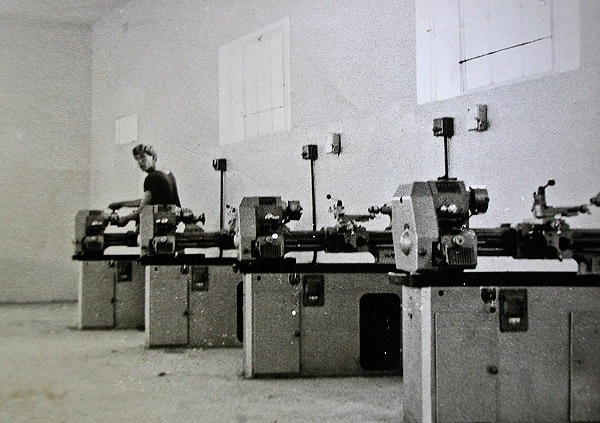
I can’t say enough about Chris Lackey, shown here attending machines in his metal-working shop that was across a courtyard from my woodworking shop. As a mountain climber, thinker, artist, avid reader and adventurer we hit it off immediately. He was British volunteer with a slow deliberate Lancashire accent. He was my closest friend, confidant, house mate and partner in technical studies filling in the gaps in my knowledge. He was immensely popular with his students due to his patience and humility.
Swaziland would transform him along similar lines it did me. He took up painting there and would go on to be a highly regarded art instructor. We would meet up again in the Yorkshire Dales decades later. read more ». Sadly Chris passed away in 2011, a victim of cancer. We had several phone conversations and email exchanges during his final days.
Another British volunteer at our school was Martin Higgs who served as a science teacher during my first year after which he went on to his university studies and an illustrious career with Shell Oil. We shared many good times together while at Salesian. We met up again in London on my way home and again when he and his wife visited me in Detroit years later. We remain good friends.
I will miss my long quiet days in the mountains. They have been a most beneficial in giving the time and means to sort out and digest my learning and education. I’m now refreshed and eager to return to university.
Addendum
12 Dec 1970
I went to Lorenzo Marques a couple of weeks ago to play in a chess tournament. I had great fun although I did not do particularly well. (I won 2 lost 3 and drew 3 games).
Chris has just left to hitch off to Johannesburg to catch his flight out so I’m all alone. It is a feeling like in college where everyone else has completed his final exams and gone home, but I’m left in a hollow dormitory.
This was my last letter for Swaziland. I departed soon after for a meandering six month journey of discovery that wound through the Middle East and Europe and returned me home to the USA. This episode is related in the following letters written on "The Journey Home".
More Swaziland - Table of Contents »»
The Journey Home
Flying over Ethiopia
25 December 1970
I am high over Ethiopia at the moment heading out toward the Red Sea then north to Israel. The land below is beautifully rugged with deep valleys cutting the flat plains. I saw snow for the first time in two years Friday when flying from Nairobi to Addis Ababa...
Continue to "The Journey Home" Letters »
"Letters from Swaziland" and "The JourneyHome" are comprised of letters I sent to my family from 1968-1970 while serving in the first Peace Corp contingent in Swaziland and during my long journey home afterwards. They had been saved by my late mother and only discovered by my sister my sister a couple of years ago. I have edited them to remove non-relevant family matters, interspersed pictures and added clarifying text.
In 1968 I took break from my post graduate studies at the University of Michigan and joined the Peace Corps. The letters begin with the flight to Swaziland. This followed a 3 month Peace Corps training session in Baker, Louisiana where we studied siSwati, did practice teaching, underwent 'sensitivity training', got our shots and got to know each other.
Enjoy, Lowell Boileau 2012
More Swaziland - Table of Contents »»
After Swaziland I took a long meandering six month journey home and eventually wound up in graduate school in Detroit.
I had been transformed by my experience. I soon tossed aside a full paid scholarship and ‘quit school forever’ to be an artist [said to myself only of course]. For the next eight years I drove truck as Sears delivery driver while I figured things out. It was ideal, a good paying Teamster job, worked only about half of the year allowing for frequent extended visits to Mexico and the opportunity to self- learn painting.
I finally managed an exhibition in 1980, sold practically everything in the show and went on to make a modest living as a fine art painter exhibiting primarily in Detroit and Chicago. I also got married to my wife Susan and had my only child, my son Nicolas. In 1992, following an art exchange tour in Germany, having some money and realizing my kid needed to be cyber-exposed, I bought a computer. To my surprise I took to it like a duck to water.
I was prepared to witness the dawn of the World Wide Web the following year. [There were only 30 websites in the world until April 1993 when the first web browser premiered.] I jumped in with both feet, with the idea of selling my art on my own and cutting out the gallery commissions, and cobbled out the first fine art website in Detroit. The web exploded the following year and suddenly my primitive html knowledge and ability to combine it graphics became in great demand. Lucky timing as it was in the midst of an art sales depression. So I became an ‘accidental businessman’ helping create the first cyber cafe in Detroit and designing the first Detroit Tigers website among other activities.
I was also intrigued with the potential of the web as a new art medium and developed ‘for art’ websites as a means of creative expression. Consequently, I have moved along a dual path of owning an internet solutions company, now run with my son, and a creative direction through our online publications. The main one of these is www.DetroitYES.com which grew out of a 1997 250 web page tour called “The Fabulous Ruins of Detroit”, a sympathetic telling of the crisis of Detroit through its ruins.
The tour gained many accolades nationally and internationally. Following thousands of heart-felt response emails, I evolved it into solutions-based audience-driven project for the healing of Detroit by adding a discussion forum. The forum has run continuously since 1999, has had close to 2 million posts written in it and over 30 million visitor sessions.
In its current form it appears at first sight as a newspaper front page with headlines and articles. The big difference is that the headlines and articles are entirely audience-created via the forum. The headlines and their positions are determined by an algorithm-driven program that Nicolas wrote. It weighs all the thousands of discussion threads every 15 minutes to rearrange the headline articles based on recency of audience views, posts and other factors. In other words the audience determines what the headline news is, not an editorial board.
More Swaziland - Table of Contents »»
Online Art Gallery
Paintings by Lowell Boileau
www.AtDetroit.net
DetroitYES!
The Discuss Detroit! Forums
The Fabulous Ruins of Detroit
www.DetroitYES.com
Soulful Detroit
Motown Era Detroit
www.SoulfulDetroit.com
The Lost Synagogues of Detroit
www.Shtetlhood.com
AtDetroit,LLC
Internet Solutions
www.AtDetroit.com
More Swaziland - Table of Contents »»
© Lowell Boileau - All Rights Reserved.
